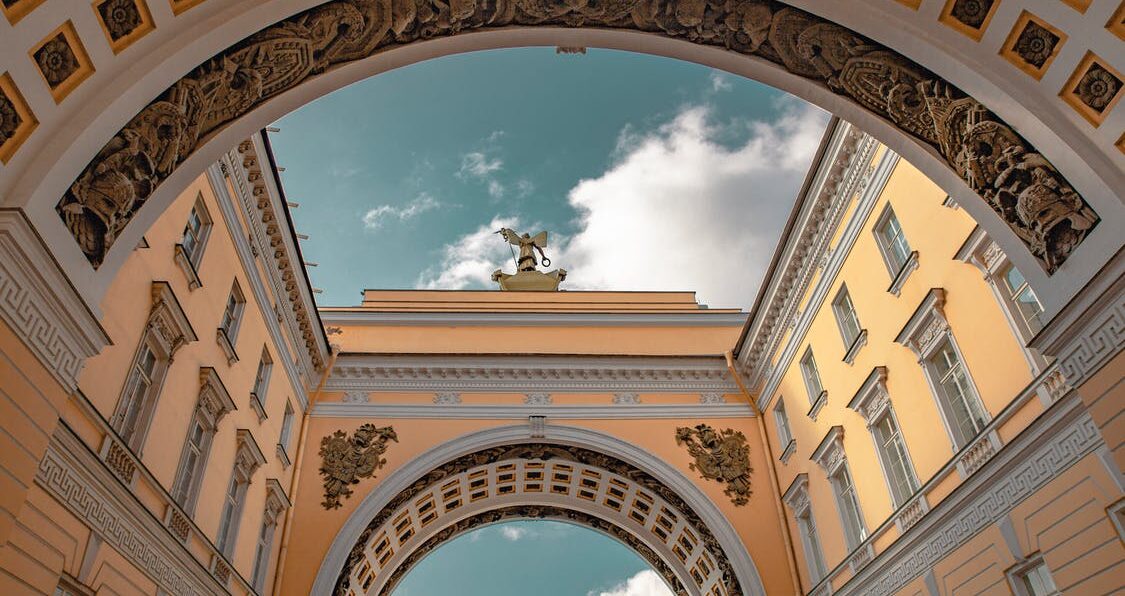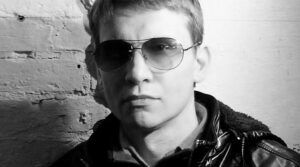
Ildar Abuziarov was born in 1975 in Nizhny Novgorod. In 2000 he graduated from Nizhny Novgorod University with a degree in history. At the same time, he studied Islam in Moscow. He is the author of several novels: HUSH, Kurban-Roman, The Autumn of Djinn, Mutabor, and other books. His novel HUSH was longlisted for the National Bestseller Prize and the Big Book Prize. Mutabor was shortlisted for the 2013 National Bestseller. His Concerto for Violin and Knife in Two Parts was included in the long list of the Russian National Bestseller Prize (2017).
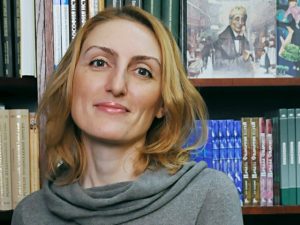 Narine Abgaryan was born in 1971 and grew up in the small town of Berd, Armenia, about two hundred miles from Yerevan, surrounded by mountains. Abgaryan, a Russian-Armenian writer, wrote a remarkable debut novel, Manyunya (2010), which was shortlisted for the Russian Big Book Award. It tells the story of two little girls, Nara and Manyunya. In 2016, she won the Yasnaya Polyana Award for her wonderful novel Three Apples Fell from the Sky (2015). Abgaryan’s works have been translated into 13 languages, including English.
Narine Abgaryan was born in 1971 and grew up in the small town of Berd, Armenia, about two hundred miles from Yerevan, surrounded by mountains. Abgaryan, a Russian-Armenian writer, wrote a remarkable debut novel, Manyunya (2010), which was shortlisted for the Russian Big Book Award. It tells the story of two little girls, Nara and Manyunya. In 2016, she won the Yasnaya Polyana Award for her wonderful novel Three Apples Fell from the Sky (2015). Abgaryan’s works have been translated into 13 languages, including English.
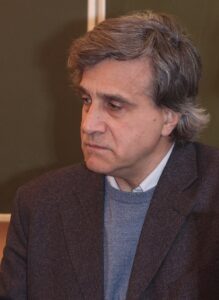
Vladimir Aristov was born in 1950. He graduated from the Moscow Institute of Physics and Technology with a doctorate in physics and mathematics. Aristov is the author of twelve volumes of poetry, two novels, and numerous articles and essays on poetry. Aristov’s poems and essays have been published in Russian literary journals (Nezavisimaya Gazeta, Arion, Vozdukh, NLO.) He is the recipient of the Alexei Kruchenykh Prize (1993), the Andrei Bely Prize (2008), and the Razlichie (Distinction) Prize (2016). His work has been included in two American anthologies of postmodern Russian poetry, The Third Wave and Crossing the Century: The New Generation in Russian Poetry. His book The Arrangement of Moscow’s Morning Streets (Устройство утренних московских улиц) was published in 2020.
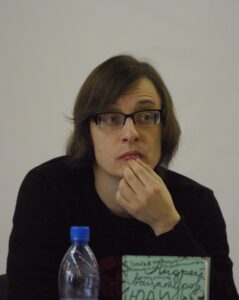 Andrei Astvatsaturov was born in 1969 in St. Petersburg. After graduating from St. Petersburg State University, Astvatsaturov began teaching at his alma mater. A specialist in American and British literature, Astvatsaturov is currently a professor of the history of foreign literature at St. Petersburg State University, specializing in Henry Miller and T.S. Eliot, and director of the literature program at the Smolny Institute. Astvatsaturov is known for his autobiographical fiction, which explores memories of his hometown of Leningrad-St. Petersburg. He became famous after the publication of his novel People in the Nude (2009). His book Don’t Feed and Don’t Touch the Pelicans (Не кормите и не трогайте пеликанов), a novel set in London, was a finalist for the National Bestseller Prize (2020).
Andrei Astvatsaturov was born in 1969 in St. Petersburg. After graduating from St. Petersburg State University, Astvatsaturov began teaching at his alma mater. A specialist in American and British literature, Astvatsaturov is currently a professor of the history of foreign literature at St. Petersburg State University, specializing in Henry Miller and T.S. Eliot, and director of the literature program at the Smolny Institute. Astvatsaturov is known for his autobiographical fiction, which explores memories of his hometown of Leningrad-St. Petersburg. He became famous after the publication of his novel People in the Nude (2009). His book Don’t Feed and Don’t Touch the Pelicans (Не кормите и не трогайте пеликанов), a novel set in London, was a finalist for the National Bestseller Prize (2020).
Ivan Akhmetev was born in Moscow in 1950. Educated at Moscow State University, where he studied physics, Akhmetov worked as an engineer, fireman, baker, and librarian. He began writing poetry in the late 1960s, but his poems were distributed only in samizdat, including under the pseudonym Ivan Alexeev. In 1982, under the same name, he participated in the typewritten almanac List of Acting Persons. In his poetic miniatures, Akhmetev develops the tradition of minimalism and concretism that comes from the “Lianozov School” of modern Russian poetry. He is the author of several volumes of poetry and his work has been translated into 13 languages. Since the 1990s he has been publishing classics of Soviet unofficial literature, including works by Kropivnitsky, Obolduev, Satunovsky, and others: Poetry of the Second Half of the Twentieth Century (2002) and Russian Poems 1950-2000 (2010). Akhmetiev is the curator of the network “Anthologies of Informal Poetry”. In 2019 he received the Brodsky Foundation grant for his poetry.
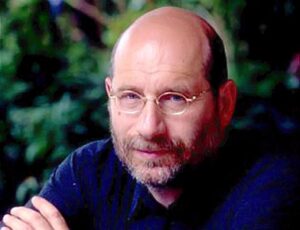
Boris Akunin is the pen name of Grigory Chkhartishvili. Akunin was born in Georgia in 1956. He graduated from Moscow State University with a degree in Japanese Studies. His first novel about Erast Fandorin, a handsome and young detective, was set in Tsarist Russia. Akunin specializes in historical mysteries set in Imperial Russia. His series The Adventures of Erast Fandorin and The Adventures of Sister Pelagia have been translated into many languages. His first “serious” novel, Aristonomiya, was published in 2012. According to Akunin, it is a historical novel with “an emphasis on ideas”. Boris Akunin was one of Russia’s bestselling suspense writers until his books were pulled from Russian bookstores in 2023 because of his criticism of the authorities. He has lived outside Russia since 2014.
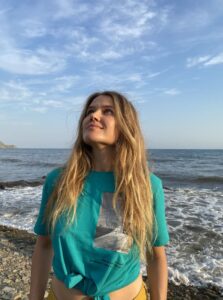 Nadya Alekseeva was born near Moscow in 1988. She studied playwriting and prose at the CWS School of Writing and has been published in “Yunost”, “Druzhba Narodov” and “Novy Mir”. She was a finalist for for the Lyceum Prize. Polunoshnitza is her debut novel. In the spring of 2016, a native of Moscow, travels to Valaam in search of his relatives and trying to restore the history of forty years ago. In the seventies there was a boarding school in the monastery on the island, where veterans of the Great Patriotic War and their families lived. Semyon finished school there and dreamed of becoming a doctor. Pavel’s motorboat passes by, spreading Ladoga into two white whiskers, where seals sunbathe on the shoal, smoke rises from the shore, and the bell that survived the war rings. Nadya tells about herself:” I work at the CWS Literary School and volunteer at the Foundation for the Care of Homeless Animals. I live in Moscow. I often go to the sea. I like to paint, to run (like most writers), a fan of author’s movies. I raise a cat. Or my cat’s raising me.”
Nadya Alekseeva was born near Moscow in 1988. She studied playwriting and prose at the CWS School of Writing and has been published in “Yunost”, “Druzhba Narodov” and “Novy Mir”. She was a finalist for for the Lyceum Prize. Polunoshnitza is her debut novel. In the spring of 2016, a native of Moscow, travels to Valaam in search of his relatives and trying to restore the history of forty years ago. In the seventies there was a boarding school in the monastery on the island, where veterans of the Great Patriotic War and their families lived. Semyon finished school there and dreamed of becoming a doctor. Pavel’s motorboat passes by, spreading Ladoga into two white whiskers, where seals sunbathe on the shoal, smoke rises from the shore, and the bell that survived the war rings. Nadya tells about herself:” I work at the CWS Literary School and volunteer at the Foundation for the Care of Homeless Animals. I live in Moscow. I often go to the sea. I like to paint, to run (like most writers), a fan of author’s movies. I raise a cat. Or my cat’s raising me.”
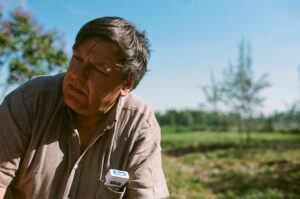
Peter Aleshkovsky was born in 1957 and graduated from Moscow State University. He worked for several years as an archaeologist in Central Asia and as a conservation historian in the Russian North before devoting himself entirely to literature in the mid-1990s. His early cycle, Stargorod, consists of 30 stories, mostly anecdotal in nature. The short novel The Seagull, rich in ethnographic detail, was nominated for the Russian Booker Prize in 1992. His book Skunk: A Life (Жизнеописание Хорька) was nominated for the Russian Booker Prize in 1994, Vladimir Chigrintsev was nominated for the same award two years later, and Fish (Рыба) was nominated for the Russian Booker Prize and the Big Book Award (2006). In 2016, Aleshkovsky won the Russian Booker Prize for his novel Fortress.
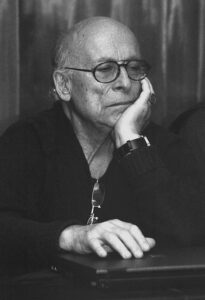
Yuz Aleshkovsky (1929-2022) was a writer, poet, playwright, and performer of his own songs. He was born in Siberia in 1929 but later his family moved to Moscow. In 1949, Aleshkovsky was drafted into the Soviet Navy, but was sentenced to four years in prison (1950-1953) for violating the disciplinary code. After serving his sentence, Aleshkovsky returned to Moscow. From the very beginning of his literary career, his works were available only in samizdat. Some of his poems were included in the self-published almanac Metropol (1979). With no hope of being published officially in the Soviet Union, Aleshkovsky emigrated to the West in 1979. The following year he was invited to the United States and settled in Connecticut, where he lived and worked as a visiting Russian émigré writer. Aleshkovsky had a distinctive writing style – a combination of story and satire. He was the author of Kangaroo and Nikolai Nikolaevich.
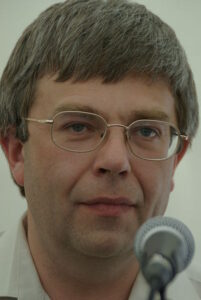
Maxim Amelin was born in Kursk in 1970. He graduated from the Maxim Gorky Literary Institute. For fourteen years he was the director of the St. Petersburg Symposium Publishing House. Now he is the editor-in-chief of the OGI and B.S.G. publishing houses. Amelin is the author of several books of poetry: Dubia (1999), The Gorgon’s Steed (Конь Горгоны), 2003, and the collection of poems, articles and essays The Curved Speech (Гнутая речь), 2011. Amelin’s poetic style is somewhat unique on the contemporary Russian poetry scene. His first book Cold Odes (Холодные оды) (1996) was written in the neoclassical tradition of the 18th century, influenced by Vasily Trediakovsky. Amelin is also a translator of Catullus, Homer and other ancient Greek poets. He is the recipient of numerous literary awards, including the Moscow Account (2003), the Bunin Prize (2013), and the National Poet Prize (2017). The Joyful Science: Selected Poems of Maxim Amelin in translation by Derek Mong and Anne Fisher, was published in New York in 2018. Amelin lives in Moscow.
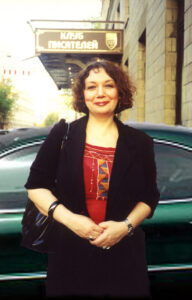
Maria Arbatova was born in Murom in 1957. Arbatova is a novelist, short story writer, playwright, journalist, talk show host, and one of Russia’s best-known feminists. She studied philosophy at Moscow State University. After graduating from the Maxim Gorky Literary Institute, she became a playwright. Arbatova is the author of 14 plays staged in Russia and abroad and 20 books. She has won the hearts of a wide audience with her books and plays. She is also one of the leaders of the Russian feminist movement, and thanks to her efforts, the concept of feminism has gained legitimacy in post-Soviet Russia. Maria’s books, her numerous appearances and statements in the press, and her social work have brought the issue of discrimination against women in Russian society to the forefront. She lives in Moscow.
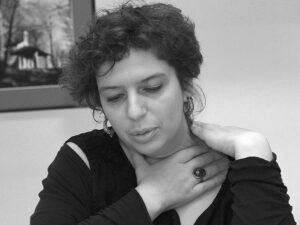
Polina Barskova was born in 1976 in St. Petersburg (Leningrad). She began publishing poetry in Russian journals and published her first book at the age of 15. She came to the United States in 1998 to continue her graduate studies at Berkeley, having already earned a degree in classical literature from St. Petersburg University. Barskova taught Russian literature at Hampshire college (Massachusetts), and now is a professor at Berkeley University. In addition to poetry, Barskova is a literary scholar on the poets of the siege of Leningrad during World War II. In 2015, she was awarded the Andrei Bely Prize, one of Russia’s most prestigious literary awards, for her first book of prose, Живые картины (Living Pictures), which was translated into English and published in 2022.
_______________________________________________________
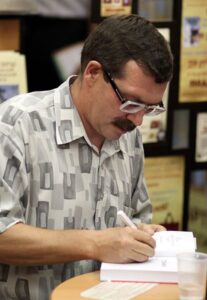
Pavel Basinsky was born in Frolovo, a small city in the Volgograd region in 1961. He attended Saratov University and Moscow’s Gorky Literary Institute. He has a PhD in comparative literature. In 2008 he undertook a literary experiment – the creation of a universal Russian novel. The Russian Novel, or the Life and Adventures of John Polovinkin claims to be a combination of several genres: a detective story, a love story, a mystical novel, a political novel, an adventure novel, etc. In July 2010, Basinsky’s book, Leo Tolstoy: Escape from Paradise, was published, reprinted twice in two months, and won the Big Book Prize. Basinsky’s book Лев в тени Льва (Lev in Leo’s Shadow) chronicles Tolstoy’s relationships with his children, especially his third son Lev. In 2014, he was awarded prize for the book Saint against Leo. John of Kronstadt and Leo Tolstoy: A Story of an Enmity. His documentary books on the life and work of Leo Tolstoy have unleashed a new wave of interest in the phenomenon of the “Apostle from Yasnaya Polyana”. In addition to being a Tolstoy expert, he has written three books on Maxim Gorky and edited anthologies of writers such as Gorky, Mandelstam, Leonid Andreyev, and Mikhail Kuzmin. In 2022, Basinsky’s new book Podlinnaia istoriia Anny Kareninoi was nominated for the National Bestseller Award. He says: “I am aware that there is no true story of Anna Karenina. There are as many Anna Kareninas as there are readers of this novel. But I flatter myself with the hope that my book will help fans like me who are hooked on this novel to make sense of their own personal Annas. Of course, without having to agree with me”.
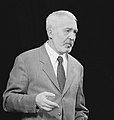
Andrei Bitov (1937-2018) has been called the “founder of Russian postmodernism”. He was born in Leningrad and graduated from the Leningrad Mining Institute (1962). He was the author of numerous novels and short story collections: Prisoner of the Caucasus, Life in Windy Weather, The Monkey Link, and others. His masterpiece Pushkin’s House, which depicts the Soviet reality of the 1960s, is considered one of the first works of Russian postmodernism. Bitov was awarded the Bunin Prize in 2006 for his prose collection Palace Without a Tsar. Bitov’s work has been translated into a number of European languages, including English, German, Swedish, French, and Italian.
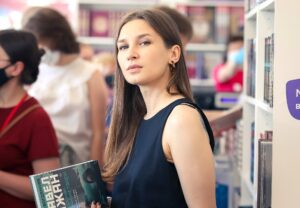
Vera Bogdanova was born in 1986 in Moscow. In 2011, she graduated from the Linguistics Department of Moscow State University with a degree in Linguistics. After taking advanced training in New York, she worked in logistics and marketing. In 2020, Bogdanova’s manuscript Pavel Zhang and Other River Creatures became a finalist for the Lyceum Award. In 2021, the novel was published by Elena Shubina and became a finalist for the Big Book and Yasnaya Polyana Prizes. The novel tells the story of Pavel Zhang, a programmer in the Moscow office of a Chinese company. Bogdanova managed to write a vivid dystopian novel about an orphan who wanted to become successful, but failed, and the near future in which Russia may find itself under the total state and Chinese technological control.
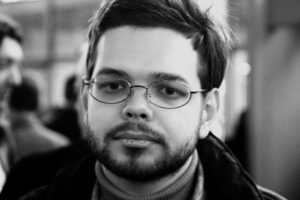
Vasily Borodin (1982-2021), one of the most talented poets and essayists of his generation, had an enormous influence on contemporary Russian poetry. Vasily Borodin was born in 1982 in Moscow, graduated from the Moscow Metallurgical Institute, worked as an editor, essayist and literary critic. Borodin’s path to poetic fame was unusual. He began writing poetry in his early childhood, but his first publication did not appear until 2005 on the website Polutona. He wrote five books of poems: Luch. Parus (2008), P.S. Moscow – Gorod-jiraph (2011) and others. He was a finalist for the poetry prize “Distinction” (2013). For his brilliant collection, Losinyi Ostrov, Borodin was awarded the Andrew Bely Prize (2015). His last book of poems, Mashenka, came out in 2019.
 Marina Boroditskaya was born in Moscow in 1954. She graduated from the Moscow State Institute of Foreign Languages in 1976. Boroditskaya is the author of several books of poetry, books of poetry for children, and numerous translations of poetry and fairy tales from English. Many of her poems have been translated into English. They have appeared in publications on both sides of the Atlantic.
Marina Boroditskaya was born in Moscow in 1954. She graduated from the Moscow State Institute of Foreign Languages in 1976. Boroditskaya is the author of several books of poetry, books of poetry for children, and numerous translations of poetry and fairy tales from English. Many of her poems have been translated into English. They have appeared in publications on both sides of the Atlantic.
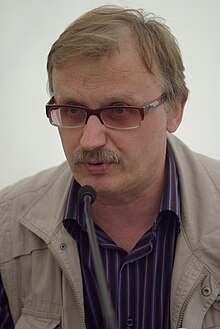
Ilya Boyashov was born in Leningrad in 1961 into a family of composer. He studied history at the Herzen Pedagogical Institute with a special interest in the military history of the 20th century. He is the author of several books. In 2007 he won the National Bestseller Prize for The Way of Muri, the allegorical story of a cat’s journey across Europe after losing his home and owners during the war in Bosnia. His novel Tank Driver or the White Tiger (2008), about the Soviet tank driver, was shortlisted for the National Bestseller and Big Book Awards and was adapted for the screen by Karen Shaknazarov in 2012. He lives in Peterhof.
 Dmitry Bykov (pen name of Dmitry Zilbertrood) was born in Moscow in 1967. Bykov has authored more than 80 books, including novels, poetry, biographies, and literary criticism. Educated at Moscow State University, where he studied literature, he worked as a journalist and TV presenter. In 1990s, he became a member of “Courtouaznye Manieristy” group of poets who specialized in writing ironic poetry. His acclaimed Biography of Pasternak (2005) became a sensation after its publication. It won the National Bestseller Prize (2005), and the Big Book Prize (2006). The biography differentiated with prior accounts of Doctor Zhivago. Bykov is the author of several novels, two collections of short stories, and several collections of poetry. Bykov won the National Bestseller Prize again in 2011 for Ostromov, or the Sorcerer’s Apprentice, a novel about freemasons in Leningrad during the 1920s. After years of cultural presence in Russia, he is now in exile. Bykov lives in the United States.
Dmitry Bykov (pen name of Dmitry Zilbertrood) was born in Moscow in 1967. Bykov has authored more than 80 books, including novels, poetry, biographies, and literary criticism. Educated at Moscow State University, where he studied literature, he worked as a journalist and TV presenter. In 1990s, he became a member of “Courtouaznye Manieristy” group of poets who specialized in writing ironic poetry. His acclaimed Biography of Pasternak (2005) became a sensation after its publication. It won the National Bestseller Prize (2005), and the Big Book Prize (2006). The biography differentiated with prior accounts of Doctor Zhivago. Bykov is the author of several novels, two collections of short stories, and several collections of poetry. Bykov won the National Bestseller Prize again in 2011 for Ostromov, or the Sorcerer’s Apprentice, a novel about freemasons in Leningrad during the 1920s. After years of cultural presence in Russia, he is now in exile. Bykov lives in the United States.
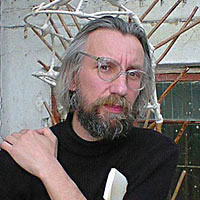 Nikolai Baitov (Goman’kov) was born in 1951 in Moscow, where he still lives. He was educated at the Moscow Institute of Electronic Technology and worked for twelve years as a programmer. In 1987 he gave up his job to become a church custodian. In 1985 he founded Epsilon-Salon, a “samizdat” literary magazine (together with Alexander Barash). The magazine represented the avant-garde wing of Russian literature in the mid to late 1980s. Its authors included Arkady Bartov, Oleg Temny, Valery Krupnik, Vladimir Sorokin, and Mikhail Sukhotin. Bytov’s first magazine publication was in 1989. Since then, he has published Равновесия разногласий (Balance of Disagreements) (1990), Bремена года (The Seasons) (2001), Резоны (The Reasons) (2011), and others. For his book Думай, что говоришь (Think What You Say) he was awarded the Brodsky Fellowship in 2007 and the Andrey Bely Prize in 2011. Baitov writes: “As a writer, I know that only a few phenomena of our world and human existence (and the least interesting ones) can be described in words. So I use poetry as a kind of super-language with which I can (at least try to) express the ‘unspeakable.”
Nikolai Baitov (Goman’kov) was born in 1951 in Moscow, where he still lives. He was educated at the Moscow Institute of Electronic Technology and worked for twelve years as a programmer. In 1987 he gave up his job to become a church custodian. In 1985 he founded Epsilon-Salon, a “samizdat” literary magazine (together with Alexander Barash). The magazine represented the avant-garde wing of Russian literature in the mid to late 1980s. Its authors included Arkady Bartov, Oleg Temny, Valery Krupnik, Vladimir Sorokin, and Mikhail Sukhotin. Bytov’s first magazine publication was in 1989. Since then, he has published Равновесия разногласий (Balance of Disagreements) (1990), Bремена года (The Seasons) (2001), Резоны (The Reasons) (2011), and others. For his book Думай, что говоришь (Think What You Say) he was awarded the Brodsky Fellowship in 2007 and the Andrey Bely Prize in 2011. Baitov writes: “As a writer, I know that only a few phenomena of our world and human existence (and the least interesting ones) can be described in words. So I use poetry as a kind of super-language with which I can (at least try to) express the ‘unspeakable.”
Denis Butov was born in 1975. Butov lives in Krasnoyarsk, Siberia. He spent two years on active duty in Chechnya. Butov is devoted to the military theme. His Five Days of War plunges the reader into the midst of fierce fighting and miraculous rescue from certain death. How Dreams Don’t Come True is a novel about the inability of an ex-serviceman to return to civilian life after serving in Chechnya.
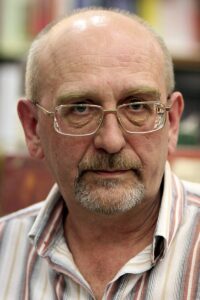 Yury Buida was born near Kaliningrad in 1954. He graduated from Kaliningrad University in 1982, then worked as a photojournalist and deputy editor of a regional newspaper. He has lived in Moscow since 1991. He currently works as an editor for the newspaper ‘Коммерсантъ.” He is the author of several novels: The Domino Player (1993), Иго (1996), Boris and Gleb (1997). In his works, everyday life is combined with the grotesque. In his novel Прусская невеста (The Prussian Bride) Buida explores the theme of “the complex relationship of the local inhabitants to the past history of the Kaliningrad region”. His novel Blue Blood was nominated for the Big Book Award in 2011. In 2012 he published the grotesque novel Вор, шпион и убийца (Thief, Spy and Murderer). The novel was nominated for the Big Book Prize (2013). In his new novel, Дар речи (2023) (The Gift of Speech), Buida traces modern Russian history from the Revolution to the present through the story of one family. It was shortlisted for the Big Bok Prize 2023.
Yury Buida was born near Kaliningrad in 1954. He graduated from Kaliningrad University in 1982, then worked as a photojournalist and deputy editor of a regional newspaper. He has lived in Moscow since 1991. He currently works as an editor for the newspaper ‘Коммерсантъ.” He is the author of several novels: The Domino Player (1993), Иго (1996), Boris and Gleb (1997). In his works, everyday life is combined with the grotesque. In his novel Прусская невеста (The Prussian Bride) Buida explores the theme of “the complex relationship of the local inhabitants to the past history of the Kaliningrad region”. His novel Blue Blood was nominated for the Big Book Award in 2011. In 2012 he published the grotesque novel Вор, шпион и убийца (Thief, Spy and Murderer). The novel was nominated for the Big Book Prize (2013). In his new novel, Дар речи (2023) (The Gift of Speech), Buida traces modern Russian history from the Revolution to the present through the story of one family. It was shortlisted for the Big Bok Prize 2023.
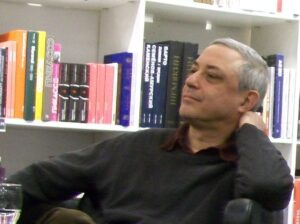
Evgeny Chizhov was born in 1966 in Moscow. After graduating from the Law Faculty of Moscow State University in 1988, he worked as a lawyer. In 1994 he briefly moved to Germany and returned to Russia three years later. Since then, he has worked as a journalist and translator. Chizhov’s literary debut was in 1997. In 2000, “October” published his novel The Dark Past of the Man of the Future. Chizhov’s second novel, A Character Without a Role, was published in 2008. The next novel, Перевод с подстрочника (Translation from the Interlinear (2013), became a finalist for the Yasnaya Polyana and Big Book prizes. In 2020, he received the Yasnaya Polyana prize for the book Собиратель рая (The Collector of Paradise). The Collector of Paradise is an interesting take on the theme of nostalgia, which prevents us from living in the present. The novel is set in the 1990s, when the collapse of the Soviet Union left the characters’ entire futures in the past: Kirill, a regular at Moscow’s flea markets, and his mother, who suffers from Alzheimer’s, both illustrate different aspects of returning to the past and disconnecting from the present.
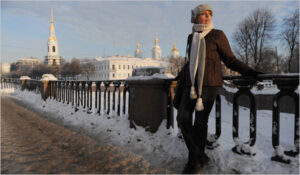 Elena Chizhova was born in 1957 in Leningrad, now St. Petersburg. Chizhova turned to writing in 1996 after being rescued from a burning cruise ship. Her novel The Time of Women about the remarkable ability of Russian women to cultural resistance during hard times won the Russian Booker Prize in 2009. She is the director of the local PEN center in St. Petersburg. In 2017, she said, the main challenge facing the St. Petersburg PEN is that the Russian authorities are currently trying to “provincialize” Petersburg. When asked about her literary preferences in 2011, Chizhova recommended several books: Pavel Basinsky’s Leo Tolstoy: Flight from Paradise; Elena Katishonok’s Once There Was an Old Man and His Wife; and Eduard Kochergin’s Angel Doll.
Elena Chizhova was born in 1957 in Leningrad, now St. Petersburg. Chizhova turned to writing in 1996 after being rescued from a burning cruise ship. Her novel The Time of Women about the remarkable ability of Russian women to cultural resistance during hard times won the Russian Booker Prize in 2009. She is the director of the local PEN center in St. Petersburg. In 2017, she said, the main challenge facing the St. Petersburg PEN is that the Russian authorities are currently trying to “provincialize” Petersburg. When asked about her literary preferences in 2011, Chizhova recommended several books: Pavel Basinsky’s Leo Tolstoy: Flight from Paradise; Elena Katishonok’s Once There Was an Old Man and His Wife; and Eduard Kochergin’s Angel Doll.
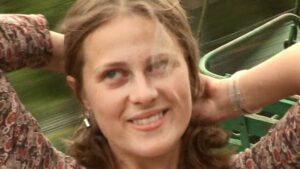
Lada Chizhova was born in 1991 in Novoaltaisk, Siberia, but later moved to Moscow. Since then, she has been a student at the Maxim Gorky Literary Institute. Her first publications appeared on the websites New Reality, Polutona and Litkarta.ru. They were noticed by the public and critics, but her rise to fame and literary success came after her media appearances on the Internet. Her works were included in a long list of nominees for the 2012 LiteratuRRentgen Award. Chizova’s poetic style is unusual: her verse libre poetry creates a universal and beautiful image of the world around her. Her poems have been translated into Italian.
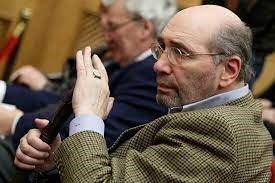 Alexander Chudakov (1938-2005) was born into a family of teachers in Shchuchensk, Kazakhstan. He graduated from the Department of Philology at Moscow State University in 1960 and received his Ph.D. in 1983. After graduation, he worked at the Institute of World Literature, taught at Moscow State University, the Gorky Literary Institute. Since 1988, he has taught at universities in Hamburg, Michigan, Los Angeles, Seoul and Cologne. A member of the International Chekhov Society, he has published over two hundred articles on classical Russian writers of the nineteenth century and on the history of Russian philology. He is the author of widely admired memoirs of such leading Russian literary scholars as Viktor Shklovsky, Viktor Vinogradov, and others, as well as books: Poetika Chekhova (Chekhov’s Poetics, Ardis Press, 1983); Mir Chekhova. In 2000, Chudakov published his novel The Darkness Falls on the Ancient Stairs in the magazine “Znamya”, which La Pensée Russe called “the great literary event of 2000”. It was nominated for the Russian Booker Prize in 2001. In 2011, the novel won the Booker of the Decade (posthumously).
Alexander Chudakov (1938-2005) was born into a family of teachers in Shchuchensk, Kazakhstan. He graduated from the Department of Philology at Moscow State University in 1960 and received his Ph.D. in 1983. After graduation, he worked at the Institute of World Literature, taught at Moscow State University, the Gorky Literary Institute. Since 1988, he has taught at universities in Hamburg, Michigan, Los Angeles, Seoul and Cologne. A member of the International Chekhov Society, he has published over two hundred articles on classical Russian writers of the nineteenth century and on the history of Russian philology. He is the author of widely admired memoirs of such leading Russian literary scholars as Viktor Shklovsky, Viktor Vinogradov, and others, as well as books: Poetika Chekhova (Chekhov’s Poetics, Ardis Press, 1983); Mir Chekhova. In 2000, Chudakov published his novel The Darkness Falls on the Ancient Stairs in the magazine “Znamya”, which La Pensée Russe called “the great literary event of 2000”. It was nominated for the Russian Booker Prize in 2001. In 2011, the novel won the Booker of the Decade (posthumously).
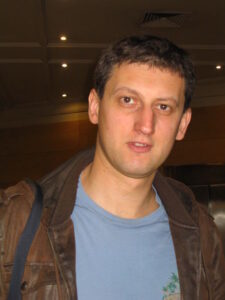
Lev Danilkin was born in 1974 in Vinnitsa, Ukraine. He is a Russian writer and literary critic. He is also an editor at “Rossiyskaya Gazeta.” He graduated from Moscow State University and holds a Ph.D. in Russian Philology. Among his colleagues, Danilkin is often praised as “the leading literary critic” in Russia. He is the author of biographical works on Yuri Gagarin and Alexander Prokhanov. Danilkin is the winner of the Big Book Prize (2017) for his book Lenin: The Pantocrator of Sun Dust ( Ленин: Пантократор солнечных пылинок), one of the most interesting works about the founder of the Soviet state Vladimir Lenin.
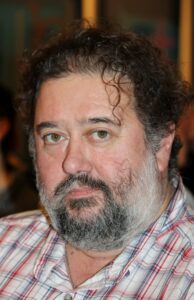
Dmitry Danilov was born in Moscow in 1969. Danilov began his career as a journalist and corporate writer, often writing about his travels in Russia. He is currently the editor-in-chief of the website of a major car manufacturer. Danilov’s book Описание города (Description of a City) about monthly trips to a southern Russian city was among the finalists for the Big Book Award in 2013. In the late 2010s, Danilov began to publish poems and plays, winning several awards. His play The Man from Podolsk was awarded the 2018 Golden Mask for the best drama/playwright. This is his first and very successful play, a disturbing satire on the omnipresent paternal state that infiltrates people’s lives. His latest novel Саша, привет! (Hi, Sasha!) has been nominated for Big Book Prize -2022. Danilov’s books have been translated into English. He lives in Moscow.
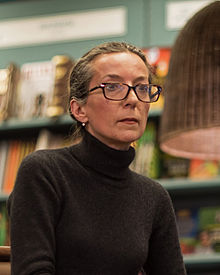 Polina Dashkova, the pen name of Tatiana Polianchenko, was born in Moscow in 1960. Dashkova, a graduate of the Maxim Gorky Literary Institute, is Russia’s most successful mystery writer, with a total of 40 million copies of her books sold so far.
Polina Dashkova, the pen name of Tatiana Polianchenko, was born in Moscow in 1960. Dashkova, a graduate of the Maxim Gorky Literary Institute, is Russia’s most successful mystery writer, with a total of 40 million copies of her books sold so far.
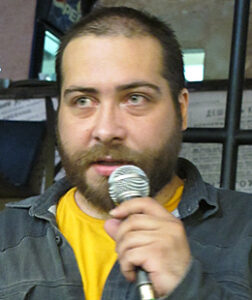
Danila Davydov was born in 1978. He graduated from the Maxim Gorky Literary Institute and holds a Ph.D. in philology. He is a prominent scholar in the field of naïve and primitive poetry and a literary critic. Davydov is the author of four books of poetry and was the first laureate of the Debut Prize (2000) for his collection of short stories Experiences in Heartlessness. From 1999 to 2004, he was the Chairman of the Russian Union of Young Writers “Vavilon.” He edited Brother’s Cradle: the Début Anthology of Poetry, and was the contributing editor of Nine Measurements: An Anthology of New Russian Poetry (2004). His poetic style is ironic and often includes quotations from folklore and other poets. In his poems he creates an image of a metropolis where people are lost and don’t know where they came from or what their purpose is.
Andrey Dmitriev is a fiction writer and screenwriter. He was born in Leningrad in 1956. He studied at the Department of Philology at Moscow State University and graduated from the VGIK. Currently, he lives in Moscow. He is the author of four books of prose. His novel The Villager and the Teenager won the Russian Booker-2012. The novel This Shore ( Этот берег) has been shortlisted for the Big Book Award-2021. Andrei Dmitriev’s novel is set in modern-day Ukraine, where the hero, a retired schoolteacher, flees Russia, driven by his own fears and a combination of ridiculous circumstances. Thanks to a chance meeting, the hero’s second life begins – a dramatic continuation of his first.
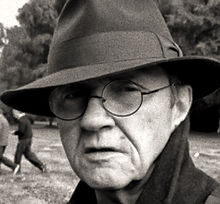 Arkady Dragomoshchenko (1946-2012) was born in Potsdam, Germany. In 1969 he moved to St. Petersburg. He was educated at the Vinnitsa Institute of Education, where he studied literature, and at the St. Petersburg Institute of Theatre, Music and Cinema. He worked as an editor and as a journalist. Dragomoshchenko started writing poetry in 1970s but published a first poem in a literary magazine in 1985. He is considered the foremost representative of “language poetry” in contemporary Russian literature. His poetic style is often compared to the style elaborated by the American L*A*N*G*U*A*G*E poets. He won the Andrey Bely Prize in 1978.
Arkady Dragomoshchenko (1946-2012) was born in Potsdam, Germany. In 1969 he moved to St. Petersburg. He was educated at the Vinnitsa Institute of Education, where he studied literature, and at the St. Petersburg Institute of Theatre, Music and Cinema. He worked as an editor and as a journalist. Dragomoshchenko started writing poetry in 1970s but published a first poem in a literary magazine in 1985. He is considered the foremost representative of “language poetry” in contemporary Russian literature. His poetic style is often compared to the style elaborated by the American L*A*N*G*U*A*G*E poets. He won the Andrey Bely Prize in 1978.
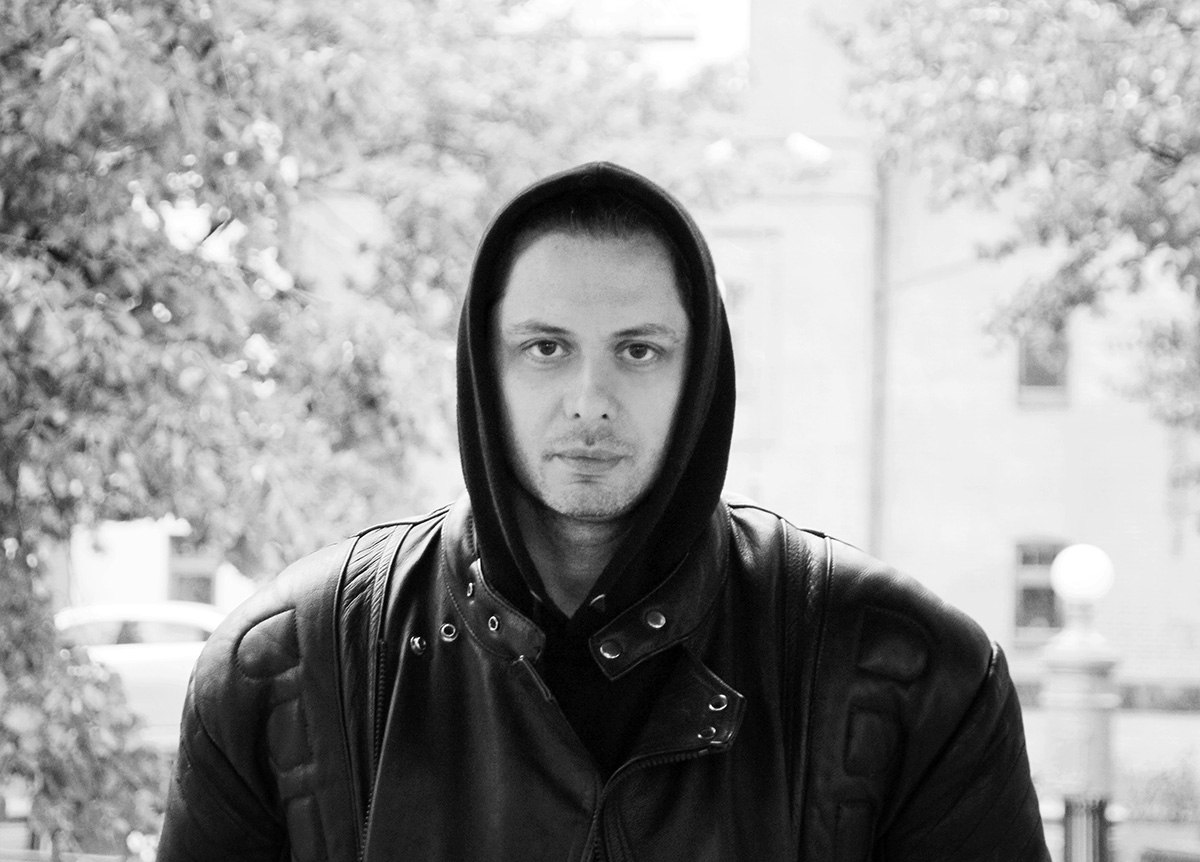
Mikhail Elizarov was born in 1973 in Ivano-Frankovsk, Ukraine. He graduated from Kharkov State University with a degree in philology. He also studied vocal and film studies in Berlin, Germany. His novel Pasternak and collection Krasnaya Plyonka were nominated for the National Bestseller Prize. His novel The Librarian ( Библиотекарь) won the Russian Booker Prize (2008). This book about the lost generation of Soviet people is one of the striking works of Russian postmodernism of recent days. After several years of “silence,” Elizarov published a new novel in 2019. His brilliant novel Земля (The Earth or The Dirt) won the National Bestseller Prize (2020). Russian literary critic Viktor Toporov characterizes Elizarov as one of only two or three contemporary visionary writers of Russian literature (along with Vladimir Sharov and Sasha Sokolov).
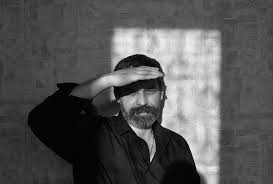
Oleg Ermakov was born in 1961 in Smolensk. He worked as a park ranger in the Barguzinsky, Altai and Baikal national parks (1978-1980), then as an employee in the regional newspaper and a correspondent in Smolensk. In 1981-83, he served in the Soviet Army in Afghanistan. This experience formed the basis of his first books Afghan Stories (1993), Afghan Tales: Stories from Russia’s Vietnam. His Радуга и Вереск (Rainbow and Heather) was shortlisted for the Big Book Prize-2018. It could be defined a post-modern novel reflecting on the modernity and past of Smolensk.
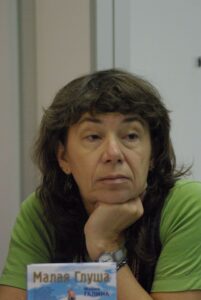
Maria Galina was born in Twer’ in 1958. Since 1987, she has lived in Moscow. A graduate of Odessa University majoring in marine biology, she had taken part in several sea expeditions in her youth. She has been a professional writer since 1995. Two of her novels, Little Boondock and Mole-Crickets (Медведки), were nominated for the Big Book Prize in 2009 and 2012. Her fiction contains a strong element of “magic realism”. She is the author of Iramifications (2009) translated into English. It is an example of Russian “fantasy” genre.
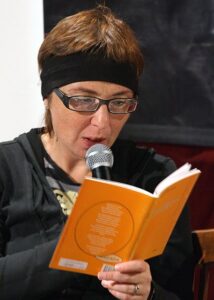
Elena Fanailova was born in 1962 in Voronezh. She graduated from the Voronezh Medical Institute and received a degree in journalism from the Voronezh State University. For six years she worked as a doctor in the Voronezh regional hospital. In 1995-2012 she worked as a journalist for Radio Liberty and has lived in Moscow since the late 1990s. Fanailova is the author of eight volumes of poetry. Her poems have been translated into ten languages and anthologized in English in Contemporary Russian Poetry (2008) and The Anthology of Contemporary Russian Women Poets (2005). Fanailova was awarded the Andrei Bely Prize in 1999 and the Moscow Count Prize in 2003. Fanailova’s recent writings, published in both Ukrainian and Russian, have come to symbolize her solidarity with Ukraine and opposition to her native Russia.
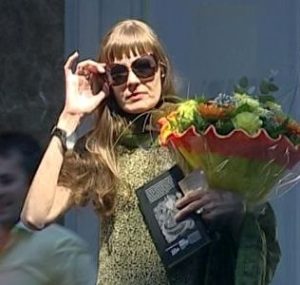 Figgle-Miggle (Фигль-Мигль)(Ekaterina Chebotaryova) appeared on the Russian literary scene in 2010. She was born in 1970 in St. Petersburg and graduated from St. Petersburg University. Her first book, You Love These Movies So Much, was shortlisted for the prestigious National Bestseller Prize in 2011. Until her novel Wolves and Bears won the National Bestseller Prize in 2013, little was known about her. Since then, she has been recognized as a talented satirist, compared to Nikolai Gogol and Victor Pelevin. She has published six novels.
Figgle-Miggle (Фигль-Мигль)(Ekaterina Chebotaryova) appeared on the Russian literary scene in 2010. She was born in 1970 in St. Petersburg and graduated from St. Petersburg University. Her first book, You Love These Movies So Much, was shortlisted for the prestigious National Bestseller Prize in 2011. Until her novel Wolves and Bears won the National Bestseller Prize in 2013, little was known about her. Since then, she has been recognized as a talented satirist, compared to Nikolai Gogol and Victor Pelevin. She has published six novels.
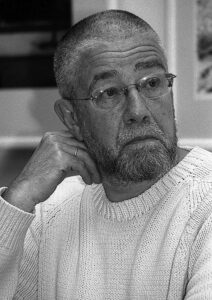
Sergey Gandlevsky was born in Moscow in 1952. As a young man he worked as a tour guide, teacher and editor. Gandlevsky began writing poetry in the 1970s and in 1975 became one of the founders of the poetry group “Moscow Time”. The group was well-known in underground Soviet literature and included Bakhyt Kenzheyev, Alexander Soprovsky and Alexei Tsvetkov. After perestroika, he received the Anti-Booker Prize for his collection of poems Celebration (1995) and the Maly Booker Prize for his novel Trepanatsiya Cherepa (1996).
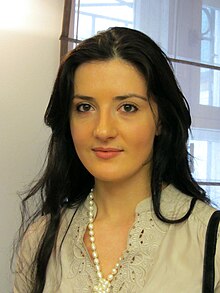
Alisa Ganieva was born in 1985 in Moscow, but soon moved with her family to her native Dagestan. A graduate of Maxim Gorky Literary Institute, Ganieva has won numerous awards for her prose and also a prize for her literary criticism. She was propelled to true stardom by her short novel Salam tebe, Dalgat! (2009) which won the Debut Prize. From the first strophes of Salam tebe, Dalgat! one is introduced to the marvelous world of the Caucasian Dagestan village. She is the author of award-winning novel The Bride and the Bridegroom (2015). In June 2015 Ganieva was listed by “The Guardian” as one of the most talented and influential young people living in Moscow.
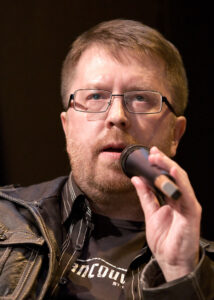
Andrei Gelasimov was born in 1965 in Irkutsk, one of the largest cities in Siberia. He studied foreign languages at the Yakutsk State University and directing at the Moscow Theatre Institute. In 2001, he became a popular in Russia when his story “A Tender Age,” originally published on the Internet, was included in an issue of the magazine “Oktyabr”. Gods of the Steppe won the 2009 National Bestseller Award in Russia. The Russian experience of World War II is told through the eyes of 12-year-old Petka Chizhov, a fatherless boy living near the country’s border with China. IIt is 1945 and the war is coming to an end when Petka befriends Red Army troops guarding Japanese prisoners of war and forms an unexpected bond with one of the camp’s prisoners, Miyanga Hirotaro. Publisher’s review: “Gelasimov moves deftly between the lives of these two characters, capturing the humor and humanity with which they face bleak circumstances.”
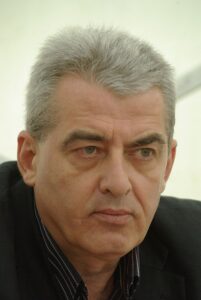
Mikhail Gigolashvili is a Russian-language novelist born in Georgia but living in Germany. He was born in Tbilisi in 1954 and received his Ph.D. from Tbilisi University, where he specialized in Dostoevsky. Before moving to Germany in 1991, Gigolashvili was a teacher and author of numerous articles and monographs on Russian literature. He currently teaches Russian at the University of Saarland. Gigolashvili’s first novel Judea (1978) was followed by The Translator (2003), a collection of short stories, Cryptograms (2007). His novel The Devil’s Wheel (2010) was short-listed for the Big Book Prize and was one of the winners of the readers’ choice vote. In 2020, his new novel Judea, 1st century was published.
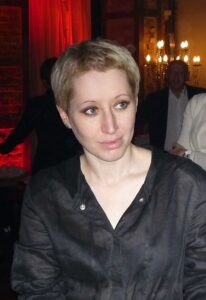
Linor (Julia) Goralik is a Russian-Israeli writer and poet. She was born in 1975 in Dnepropetrovsk, Ukraine and immigrated to Israel before moving to Moscow in 2000. She lived in Moscow from 2000 to 2014. While living in Moscow, she wrote for several Russian editions, taught fashion theory, published several books of poetry and flash fiction, two novels (both collaborative), comics, children’s books, and nonfiction – more than 20 titles in all. Among her books: Ustnoye narodnoye tvorсhestvo obitatelei sektora М1 (2011), Valery (2011), and others. She also worked in cultural marketing. Together with Stanislav Lvovsky, she organized several interesting art exhibitions and projects, bringing contemporary Jewish culture to Moscow. Her poetry is sometimes described as “new epic” style. Her works have been translated into English, Italian and Chinese. She has been the editor of the website Booknik since 2014. In 2016 she received the Joseph Brodsky Memorial Grant for Russian Poets. She lives in Israel but continues to write in Russian.
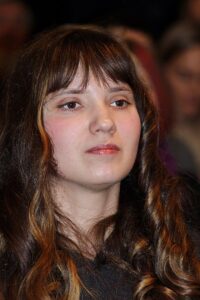
Alla Gorbunova was born in 1985 in St. Petersburg. She is a graduate of the Faculty of Philosophy at St. Petersburg State University. A poet, prose writer, and translator, she has published six books of poetry and prose and won the Andrei Bely Prize for her 2019 collection, Inside Starfall. Her first collection of short prose, Ins & Oughts, was published in 2017. Gorbunova received the NOS Jury Prize in 2020 for her Конец света, моя любовь (It’s the End of the World, My Love). The English translation was published in 2023. In 2022, ACT and Redakzia Eleny Shubinoi published her diary prose Summer (Leto) about the quarantine months of 2020, when her family stayed several months in the old dacha. It’s a wonderful book about family life in the midst of the world pandemic.
Anna Glazova is a poet, translator and scholar in German Studies and Comparative Literature with a PhD from Northwestern University. She resides in Chicago and Hamburg but writes in her native language, Russian. Glazova was born in Dubna in 1973. Glazova is the author of several volumes of poetry in Russian: Pusti, voda (Let the Water, 2003); Pyetlya. Nyevpolovinu ( 2008) and others. Glazova’s work was previously published in English in the anthology Relocations: Three Contemporary Russian Women Poets – Polina Barskova, Anna Glazova, Maria Stepanova, (2013) which was a finalist for the Best Translated Book Award in 2014 (USA). Glazova won the Andrey Bely Prize for her latest book, Dlia zemleroiki.
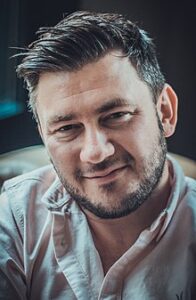
Dmitry Glukhovsky was born in Moscow in 1979. He studied journalism and international relations in Israel and lived in France and Germany. From 2002 to 2005, he worked at EuroNews in Lyon, France, before returning to Russia to continue his career at “Russia Today”(RT). He has traveled to places such as Chernobyl, the Baikonur Cosmodrome and the North Pole, where he hosted the world’s first live television broadcast in 2007. Glukhovsky’s first novel, Metro 2033, was originally published on his website in 2002 with free access for all readers. The novel became an interactive experiment that attracted thousands of readers. He is known for his bestseller It’s Getting Darker and a series of satirical stories about Russia that are critical of his homeland. He writes in the genres of science fiction, magical realism, and dystopia. Glukhovsky has emigrated from Russia and has been charged by Russian authorities for his civil position in June 2022.
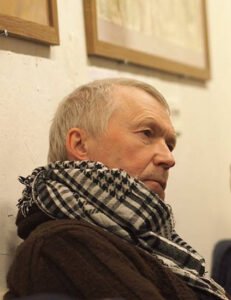
Alexander Ilyanen was born in 1958. He graduated from the Military Institute of Foreign Languages in Moscow. For more than 20 years, he served as a military interpreter. He is currently retired. Ilyanen has won the Andrei Bely Prize for his novel Boutique Vanity (2007). His And Finn and The Road to Y. were nominated for the Russian Booker Prize. His novel Пенсия (2015) was a great success with critics and has been much discussed. Illanen’s works are fragmentary and are considered one of the most interesting literary experiments of the last decade. He lives in St. Petersburg.
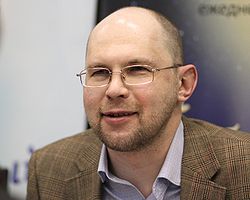 Aleksei Ivanov was born in Nizhny Novgorod in 1969. In 1971, his family moved to Perm’, where he grew up. He studied journalism at Ural State University. Ivanov earned a degree in cultural studies in 1996. Ivanov has been nominated three times for the National Bestseller Prize. He is the author of famous novel The Geographer Drank his Globe Away. The award-winning film (2013), directed by Alexander Veledinsky, was based on the novel of the same name. Ivanov’s novels The Gold of Revolt and The Heart of Parma were highly praised by critics and readers alike. In 2009, Ivanov co-wrote the screenplay for the movie “Tsar” with Pavel Lungin. Ivanov presented his new book Shadows of Teuton in 2021 in Kaliningrad.
Aleksei Ivanov was born in Nizhny Novgorod in 1969. In 1971, his family moved to Perm’, where he grew up. He studied journalism at Ural State University. Ivanov earned a degree in cultural studies in 1996. Ivanov has been nominated three times for the National Bestseller Prize. He is the author of famous novel The Geographer Drank his Globe Away. The award-winning film (2013), directed by Alexander Veledinsky, was based on the novel of the same name. Ivanov’s novels The Gold of Revolt and The Heart of Parma were highly praised by critics and readers alike. In 2009, Ivanov co-wrote the screenplay for the movie “Tsar” with Pavel Lungin. Ivanov presented his new book Shadows of Teuton in 2021 in Kaliningrad.
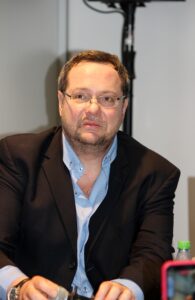
Alexander Ilichevsky is a Russian-Israeli writer. He was born in Azerbaijan in 1970. He studied physics at the Moscow Institute of Physics and Technology and in California in the 1990s. He moved to Israel in 2013, where he works as a medical physicist. Ilichevsky won the 2007 Russian Booker Prize for his novel Matisse, about a Moscow physicist who gives up a comfortable life to wander. He won second prize in the 2010 Big Book competition for The Persian, which draws on his childhood memories of Azerbaijan. Ilichevsky’s Anarchists (2012) is reminiscent of the classic Russian novel, with its long, soul-searching conversations, but it also contains a lot of graphic and violent scenes that spoils it. Ilichevsky considers himself first and foremost an Israeli writer, despite his writing in Russian, because his works are full of Jewish cultural and philosophical motifs. Nevertheless, his Newton’s Drawing (Чертеж Ньютона) won the 2020 Big Book Prize. He lives in Jerusalem.
Nikita Ivanov was born in 1989 in Yekaterinburg. He studied art and cultural studies at the local university, worked as a steward and barista. He now works as a manager at an advertising agency. In 2008 Ivanov was awarded the special prize by the jury of the LiteraturRentgen prize. He lives in Yekaterinburg.
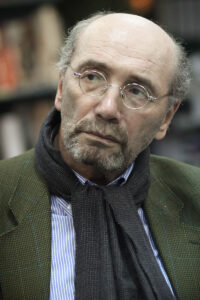
Alexander Kabakov (1943-2020) was a Russian writer and journalist. He was born in 1943 in Novosibirsk, where his family had been evacuated during World War II. He graduated from Dnepropetrovsk University and after serving in the army, he worked as an engineer in a rocket laboratory and as a journalist. He became well known during the perestroika for his dystopian novel, No Return, which was translated and widely published. In 1999, a sequel to No Return followed, the novel Condemned. His book Moscow Tales has been translated into many languages. In 2006, he received the Big Book Award for his book Everything Is Reparable.
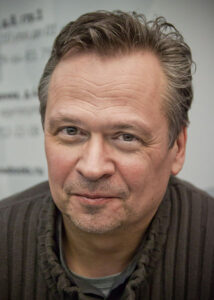
Maxim Kantor was born in 1957 in Moscow. The son of noted Soviet art historian and philosopher Karl Kantor, Kantor graduated from the Moscow Polygraphic Institute with a degree in Arts. In 1983 he organized the independent group “Krasny Dom” (Red House). The group held a number of unofficial one-day exhibitions. In 2006, Kantor published a novel, The Drawing Manual (Uchebnik risovania), which provoked controversy in the press. In 2013, Kantor’s novel, Red Light, was shortlisted for the National Bestseller Prize. He currently works as a painter in Europe and as a social commentator on Facebook and other media, specializing in pseudo-philosophical writing and criticism of the Russian authorities.
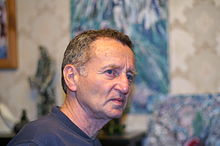 Mark Kharitonov was born in 1937 in the Ukrainian town of Zhitomir, later the family moved to Moscow. Kharitonov graduated from the Moscow Pedagogical Institute and worked as a teacher. He started to write in 1971 but only one work The Day in February appeared in print before ” glasnost'”. He wrote an excellent novel, Dva Ivana (1980), but it was not published until 1988. In 1992, Kharitonov won the first Russian Booker Prize for his novel Linii sudby, ili Sunduchok Milashevicha. In 1994 it was translated into English as Lines of Fate. It was considered one of the most interesting novels of the last decade of the Soviet Union. Written at the height of Gorbachev’s power in 1985, the book is a kind of postmodern detective story, a meditation on Russia’s past and present, and the debilitating effects of Soviet state on the nation and the Russian psyche. His prose has been described as a mixture of descriptive writing and extended intellectual commentary.
Mark Kharitonov was born in 1937 in the Ukrainian town of Zhitomir, later the family moved to Moscow. Kharitonov graduated from the Moscow Pedagogical Institute and worked as a teacher. He started to write in 1971 but only one work The Day in February appeared in print before ” glasnost'”. He wrote an excellent novel, Dva Ivana (1980), but it was not published until 1988. In 1992, Kharitonov won the first Russian Booker Prize for his novel Linii sudby, ili Sunduchok Milashevicha. In 1994 it was translated into English as Lines of Fate. It was considered one of the most interesting novels of the last decade of the Soviet Union. Written at the height of Gorbachev’s power in 1985, the book is a kind of postmodern detective story, a meditation on Russia’s past and present, and the debilitating effects of Soviet state on the nation and the Russian psyche. His prose has been described as a mixture of descriptive writing and extended intellectual commentary.
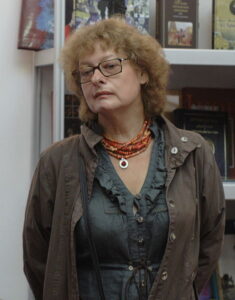
Margarita Khemlin (1960-2015) was born in Chernigov, Ukraine, but lived mostly in Moscow. She studied at the Maxim Gorky Literary Institute and worked as a reviewer for Nezavisimaya Gazeta and as an editor for Segodnya, Itogi, and Channel One Russia. Her first novel, Klotzvog, about the Soviet Jewish experience and the historical trauma of WWII through the eyes of beautiful Maya Klotzvog, was short-listed for the 2009 Russian Booker Prize. Khemlin’s novel, The Investigator (2012), was shortlisted for the Russian Booker Prize and won the NOSE Award for the Best Detective Book of the post-Soviet period. The novel is set in Soviet Ukraine in the early 1950s, and the plot unfolds around a criminal investigation. The novel deals with the Jewish legacy and the devastating consequences of the war.
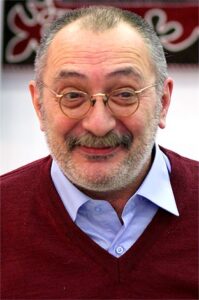 Timur Kibirov (Zapoev) was born in 1955 and graduated from the Krupskaya Pedagogical Institute. From 1975 to 1977 he served in the Soviet Army. He began publishing poetry in the late 1980s and became one of the most recognizable contemporary Russian poets. Kibirov is the author of several books of poetry, postmodernist in nature, including When Lenin Was Young (1995), Stikhi o liubvi: Albom-Portret (1993), In Memoriam Derzhavin (1996) and others. Kibirov was the first recipient of the Joseph Brodsky Memorial Fellowship Fund and received many literary prizes, including the Anti-Booker (1997). In 2010, Kibirov published his first novel, Lada, or Bliss: A Chronicle of True and Happy Love. English translations of his poems have appeared in Third Wave: The New Russian Poetry (1992) and Contemporary Russian Poetry: An Anthology (2008).
Timur Kibirov (Zapoev) was born in 1955 and graduated from the Krupskaya Pedagogical Institute. From 1975 to 1977 he served in the Soviet Army. He began publishing poetry in the late 1980s and became one of the most recognizable contemporary Russian poets. Kibirov is the author of several books of poetry, postmodernist in nature, including When Lenin Was Young (1995), Stikhi o liubvi: Albom-Portret (1993), In Memoriam Derzhavin (1996) and others. Kibirov was the first recipient of the Joseph Brodsky Memorial Fellowship Fund and received many literary prizes, including the Anti-Booker (1997). In 2010, Kibirov published his first novel, Lada, or Bliss: A Chronicle of True and Happy Love. English translations of his poems have appeared in Third Wave: The New Russian Poetry (1992) and Contemporary Russian Poetry: An Anthology (2008).
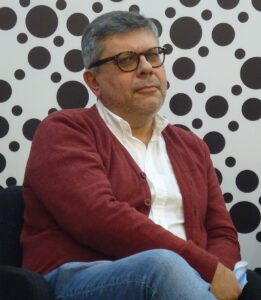
Kirill Kobrin was born in 1964 in Nizhny Novgorod and has a PhD in Medieval History. He writes fiction and nonfiction prose, co-edits Moscow magazine of culture and politics Neprikosnovenniy Zapas (Emergency Rations), and researches the cultural history of Russia, Great Britain and the Czech Republic. For fourteen years he worked as a lecturer at Nizhny Novgorod Pedagogical University. Since 2000, Kobrin has lived in Europe. He spent 13 years in Prague as a broadcaster and managing editor of Radio Free Europe/Radio Liberty (Russian Service). He is the author of 14 books and his texts have been translated into several European language. Now he resides in Riga.
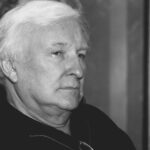 Eduard Kochergin was born in 1937, at the height of Stalin’s repression. As a young child, he was separated from his parents. They were arrested on false charges and the boy was sent to an orphanage for children of “public enemies” in Siberia. Sometime later, he escaped from the orphanage. It took him 6 years to reach Leningrad. He returned to his hometown and miraculously found his mother, who had spent ten years in prison. After graduating from the Leningrad State Theatre Institute in 1960, Kochergin became an internationally acclaimed stage and set designer and is currently the head of stage design at the Bolshoi Dramaticheskii Theatre (Tovstonogov Theatre) in St. Petersburg. He has staged over 100 plays in Russia and abroad. He is a laureate of state and international awards, a member of the Russian Academy of Arts and a professor at the Institute of Arts. His book Christened with Crosses, based on his childhood memories, won the National Bestseller Award in 2010.
Eduard Kochergin was born in 1937, at the height of Stalin’s repression. As a young child, he was separated from his parents. They were arrested on false charges and the boy was sent to an orphanage for children of “public enemies” in Siberia. Sometime later, he escaped from the orphanage. It took him 6 years to reach Leningrad. He returned to his hometown and miraculously found his mother, who had spent ten years in prison. After graduating from the Leningrad State Theatre Institute in 1960, Kochergin became an internationally acclaimed stage and set designer and is currently the head of stage design at the Bolshoi Dramaticheskii Theatre (Tovstonogov Theatre) in St. Petersburg. He has staged over 100 plays in Russia and abroad. He is a laureate of state and international awards, a member of the Russian Academy of Arts and a professor at the Institute of Arts. His book Christened with Crosses, based on his childhood memories, won the National Bestseller Award in 2010.
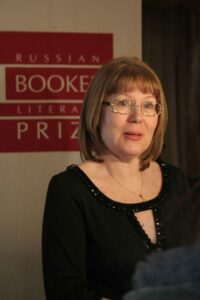
Elena Koliadina was born in Vologda. She has been a contributor to “Cosmopolitan Magazine” since 1995. Her novel The Flower Cross, a novel written in Old Russian, won the Russian Booker Prize in 2010 and became the literary sensation of the year. The narrative takes the reader back to the 17th century to a town called Totma. It is the story of a beautiful girl Theodosia, sacrificed by the local priest. The Koliadina’s style has often been criticized for its naturalism.
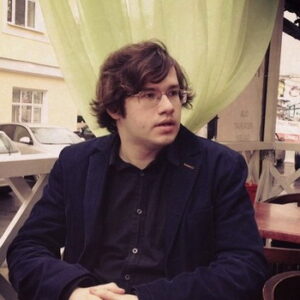
Kirill Korchagin is a poet, linguist and critic. He was born in 1986 in Moscow. His path to poetry was not typical: after graduating from the Moscow Institute of Radio Engineering, Electronics and Automation, he continued his studies and received a PhD in Russian language from the Institute of Russian Language (2012). Since then, he has been teaching at MGU and has participated in numerous projects in applied linguistics. His poetry was first published in the journals “Air” (Воздух), “Рец” and “НЛО”. Korchagin is the author of a book of poems, Предложения. He was a finalist for the LiteratuRentgen and Debut awards. He is also a recipient of the Small Prize (Московский счет). He writes in the tradition of vers libre, his poetry is innovative and paves the way for new forms of poetic expression. He lives in Moscow.
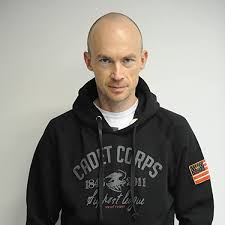
Vladimir Kozlov was born in 1972 in Mogilev, Belarus. He spent his childhood and adolescence years on the suburbs of that city. His coming-of-age years coincided with the collapse of the Soviet Union. Kozlov graduated from Minsk State Linguistic University, and then from the Indiana University (USA). He has worked as a journalist, editor, translator, screenwriter and documentary filmmaker. Since the early 2000s, Kozlov has been lived in Moscow. He is the author of a dozen books of fiction and non-fiction, including Gopniki (Hoods) (2002), SSSR (USSR) (2009), long listed for the Big Book Prize and Domoi (The Return), 2010. In 2012 he published two interesting novels: 1987 and a requiem for the 1990s Svoboda (Freedom).
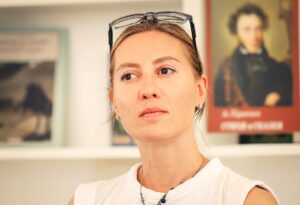
Anna Kozlova was born in Moscow in 1981. She graduated from Moscow State University with a degree in journalism. Kozlova is an award-winning novelist and screenwriter who grew up in a family of writers. A Muscovite and graduate of Moscow State University, Anna has reported for some of Russia’s leading newspapers and magazines. She has won both Russia’s top literary award for her novel F20 and Russia’s top screenwriting award for Garden Ring, a modern social saga. Her novel F20, about the life of a teenage girl, Julia, diagnosed with schizophrenia, was the winner of the 2017 National Bestseller Prize. The jury emphasized that Kozlova’s novel is “unprecedented for its modern literary sharpness and irony, and raises the question of how people with mental disorders can live in society without being outcasts.”Her latest novel is Rurik, a psychological thriller about a runaway teenager who unwittingly becomes a cause célèbre. She currently lives in Serbia.
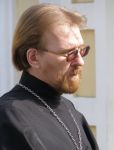 Sergei Kruglov,a poet and Orthodox priest, lives and serves in the city of Minusinsk, Siberia. He was born in 1966 in Krasnoyarsk. Kruglov studied journalism at the Siberian Federal University and worked at the local newspaper “Vlast’ Trudu”. Kruglov has published poetry since 1993. In 1999 he was ordained a priest, while continuing to write poetry. In 2002, a selection of his poems, previously anthologized in the collection Provincial Literature, was shortlisted for the Andrei Bely Prize. In 2008 he won the prize for his books Mirror (Зеркальце, 2007) and Typist (Переписчик, 2008).
Sergei Kruglov,a poet and Orthodox priest, lives and serves in the city of Minusinsk, Siberia. He was born in 1966 in Krasnoyarsk. Kruglov studied journalism at the Siberian Federal University and worked at the local newspaper “Vlast’ Trudu”. Kruglov has published poetry since 1993. In 1999 he was ordained a priest, while continuing to write poetry. In 2002, a selection of his poems, previously anthologized in the collection Provincial Literature, was shortlisted for the Andrei Bely Prize. In 2008 he won the prize for his books Mirror (Зеркальце, 2007) and Typist (Переписчик, 2008).
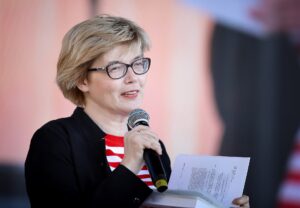
Maya Kucherskaya is a novelist, professor of literature, fiction writer, critic, and essayist. She was born in 1970 in Moscow. After graduating from Moscow State University, she received her Ph.D. in literature from UCLA (1999). She is currently a professor of Russian literature at the Moscow School of Economics. Kucherskaya writes both fiction and nonfiction, as well as scholastic works. Her first novel, God of Rain, won the Student Booker Prize, and her second novel, Auntie Mina (2012), won the Big Book Readers’ Choice Award. In 2005 she published a biography of Grand Duke Konstantin Romanov for the Lives of Remarkable People series, as well as a book of gospel stories for children. In 2021, her biography Leskov: An Unknown Genius, came out, taking second place at the Big Book Award.
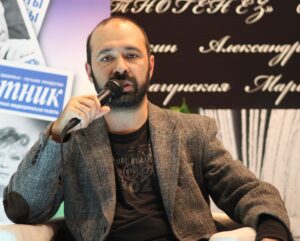
Sergey Kuznetsov was born in Moscow in 1966. He is a writer, a journalist and an entrepreneur. He graduated from the chemistry department of Moscow State University in 1988. In the 1990s, Kuznetsov turned to philology, writing a book on the poetics of Joseph Brodsky and translating Stephen King and Susan Sontag into Russian. Since 1996, he has written numerous film and literary reviews for the media and actively participated in the creation of modern Russian journalism. Kuznetsov is a well-known entrepreneur. In 2004, he and his wife founded a digital marketing agency aimed at developing and supporting social media projects. In 2018, Sergey launched Le Sallay Academy, an international secondary school.He is the author of the novels Butterfly Skin, Round Dance of Water (shortlisted for the Big Book Prize). The Round Dance of Water was translated into English and published in the US in 2022 by Dalkey Archive Press. In 2017, he published the acclaimed family saga Teacher Dymov, about members of the same family in changing times. His most recent novel, Kaleidoscope: Expendable Materials, received praise from both readers and critics. He has lived in Paris with his family since 2013.
Viktor Kulle was born in 1962 in the city of Kirovo-Chepetsk. Kulle is a poet, translator, literary critic and essayist. He is the author of Russia’s first dissertation on Brodsky’s poetry (1996) and a commentary on Brodsky’s Collected Works. Kulle is the author of the poetry collections Palimpsest (2001) and Everything Seriously (2011), and the winner of the Noviy Mir Prize (2006), the Italian prize “Lerici Pea – Mosca” (2009) and the A.M. Zverev Prize from “Inostrannaya literatura ” (2013).
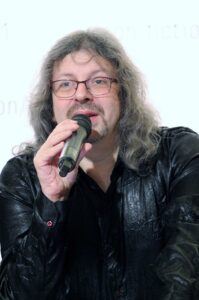
Dmitry Kuzmin is considered one of the most significant figures in contemporary Russian poetry. He was born in 1968. After graduating from Moscow Pegadodical University, he worked as an assistant professor of foreign literature and literary translation. In 1989, Kuzmin founded the Union of Young Writers “Vavilon”. In 1996, he has started the Vavilon Internet project – an online anthology of current Russian poetry. Since 1993, he has been the head of ARGO-RISK Publishers producing about 20 new poetry titles annually. A selection of his poems and translations It’s Fine to Be Alive won the Moscow Count Prize for the Best Debut Poetry Collection. Since 2006, he has been editing the literary magazine “Vozdukh”. Currently, Kuzmin lives in Latvia.
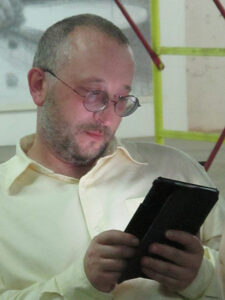
Stanislav Lvovsky was born in Moscow in 1972. He graduated from the chemistry department of Moscow State University. Lvovsky was one of the founders (along with Dmitry Kuzmin and others) of the Union of Young Writers “Vavilon” in 1989. After graduation he worked as a teacher of English and chemistry. He is the author of three books of poetry, a collection of short stories (The Word of Flowers and Dogs), and other books. He was the laureate of the 4th Festival of Free Poetry (Moscow, 1993) and the winner of the Moscow Account Minor Prize (2003). Stanislav Lvovsky was an editor-in-chief for the “Literature” section at OpenSpace.Ru, the only Internet media in Russia focused entirely on culture and later at Colta.ru.
Alexander Kuznetsov-Tulyanin was born in 1963. He graduated from Moscow State University. Currently, he works in the editorial office of the newspaper “Tulskie izvestiya” and lives in Tula. He had lived in the Kuril Islands in the Pacific for ten years. His novel Yazichnik about Kuril Islands was published in 2006. It was nominated for the Apollon Grigoryev and National Bestseller prizes. It was considered as one of the significant novels of 2006.
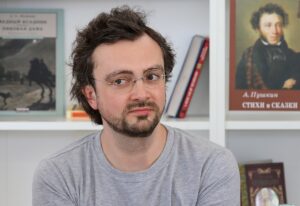
Vadim Levental was born in St. Petersburg in 1981. He received his master’s degree from St. Petersburg State University. Vadim Leventhal currently works in publishing. He is the chairman of the organizing committee of the National Bestseller Prize. His first novel Masha Regina was short-listed for the Big Book Award in 2013. The book is about a girl from provincial Russia who begins her career as screenwriter and becomes a star. The book is an interesting combination of postmodernism and psychological drama. An English translation of Masha Regina was published in the UK in 2016.
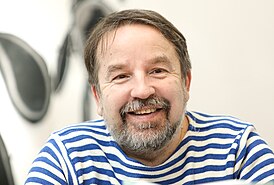
Oleg Lekmanov was born in 1967 in Krasnodarskii Krai, Russia. He graduated from the Moscow State Pedagogical University and holds a Ph.D. in Russian Poetry of the Silver Age. Lekmanov is a prominent scholar and has written numerous articles on the history of Russian poetry and literature in the 20th and 21st centuries. He was a professor at Moscow State University and the Moscow Higher School of Economics until he emigrated to Georgia, Uzbekistan, and then the United States in 2022. He is currently a visiting professor at Princeton University. Winner of the National Literary Award “Big Book” (2019); together with Mikhail Sverdlov and Ilya Simanovsky for the book “Venedikt Erofeev: The Outsider” (non-fiction).
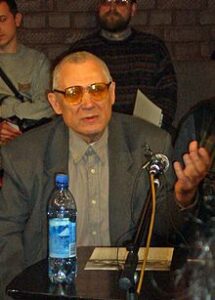 Yuri Mamleev (1931-2015), Russian philosopher, novelist, and playwright, is best known as the creator of the literary trend called Russian metaphysical realism. His work Судьба бытия (The Fate of the Existence) is among most interesting Russian metaphysical writings. During the Soviet period, Mamleev was not recognized by the regime and ignored by publishers. His early works were distributed only through samizdat, and he was forced to emigrate to the United States in 1974. In 1983 he had moved to France, where he had taught Russian language and literature. In the early 1990s, Mamleev was one of the first literary émigrés to return to Russia, where he achieved the great success. According to the critics, his short stories and his “legendary novel The Sublimes have become modern classics of Russian literature“.
Yuri Mamleev (1931-2015), Russian philosopher, novelist, and playwright, is best known as the creator of the literary trend called Russian metaphysical realism. His work Судьба бытия (The Fate of the Existence) is among most interesting Russian metaphysical writings. During the Soviet period, Mamleev was not recognized by the regime and ignored by publishers. His early works were distributed only through samizdat, and he was forced to emigrate to the United States in 1974. In 1983 he had moved to France, where he had taught Russian language and literature. In the early 1990s, Mamleev was one of the first literary émigrés to return to Russia, where he achieved the great success. According to the critics, his short stories and his “legendary novel The Sublimes have become modern classics of Russian literature“.
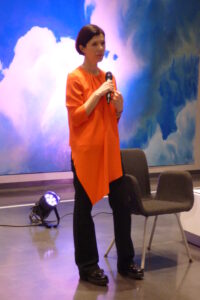
Anna Matveeva was born in 1972 in Sverdlovsk, Urals, into a family of linguists. After graduating from high school, she enrolled in the Journalism Department of the Ural State University, where she graduated in 1994. She lives and works in Moscow. The literary critic Viktor Toporov called Anna Matveeva a representative of the Ural magical realism. She is a laureate of the Lo Stellato Award (Salerno, Italy) for the best story – 2004 “St. Helena Island” (“Остров Святой Елены”), a finalist of the Big Book Award – 2013 (story collection Wait, I’ll die, and I’ll come) and Reader’s Choice Award at the Big Book Prize for the book The Nine Nineties (2015). In 2022 she received the Reader’s Choice Award of the Big Book Prize for the novel Every Hundred Years (Каждые сто лет).
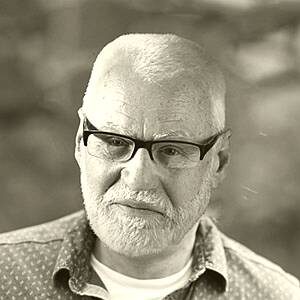 Vladimir Medvedev was born in Transbaikalia, near Lake Kinon, but lived most of his life in Tajikistan. He worked as a geologist, teacher, reporter, and news editor in literary journals. He has moved to Russia later and now Medvedev lives in Moscow. His novel, Zahhok, according to literary critic Galina Yuzefovich, is one of the best novels written in Russian recently. The novel reveals a dark page in the history of Tajikistan immediately after the collapse of the Soviet Union. The novel is set in the mountains of the Pamirs in the 1990s, where a Russian woman was forced to come after riots for the sake of saving her children. Medvedev’s brilliant narration and the polyphony of seven voices in the novel make it a fascinating, painful but gripping reading.
Vladimir Medvedev was born in Transbaikalia, near Lake Kinon, but lived most of his life in Tajikistan. He worked as a geologist, teacher, reporter, and news editor in literary journals. He has moved to Russia later and now Medvedev lives in Moscow. His novel, Zahhok, according to literary critic Galina Yuzefovich, is one of the best novels written in Russian recently. The novel reveals a dark page in the history of Tajikistan immediately after the collapse of the Soviet Union. The novel is set in the mountains of the Pamirs in the 1990s, where a Russian woman was forced to come after riots for the sake of saving her children. Medvedev’s brilliant narration and the polyphony of seven voices in the novel make it a fascinating, painful but gripping reading.
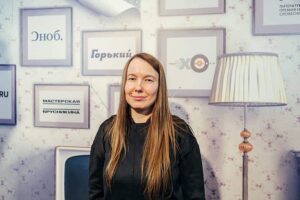
Yevgenia Nekrasova was born in 1985 near Astrakhan’ and grew up outside Moscow. After graduating from the Moscow School of New Cinema, she begun publishing her screenplays and short stories in popular journals. Until recently, Nekrasova was best known for her short prose cycle Unhappy Moscow, which was awarded the Lycee Prize in 2017. Her first novel, Kalechina-Malechina, was published in 2018 and was shortlisted for the National Bestseller, Big Book Prize, and NOSE awards in 2019. It’s a modern-day tale about a little girl facing extraordinary and dangerous events.
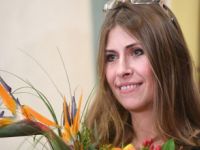
Alexandra Nikolaenko was born in Moscow in 1976. She graduated from the Moscow State “Stroganov” Academy of Design and Applied Arts. In 2002, Nikolaenko became one of the youngest members of the Moscow Union of Artists. At the same time, she began to write stories and draw illustrations for them. Her debut novel, Убить Бобрыкина. История одного убийства (To Kill Bobrykin. The Story of One Killing), was published in 2017 and became a laureate of the Russian Booker. It has brought fame to the aspiring author. The unusual plot about a hero obsessed with revenge has been compared by some critics to classical novels, while others consider it experimental and innovative.
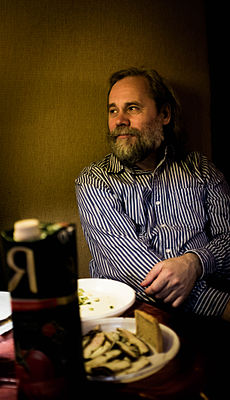
Sergei Nosov was born in 1957 in Leningrad. He graduated from the Leningrad State Institute of the Aerospace (1980) and completed his studies at the Maxim Gorky Literary Institute (1988). He is the author of several successful novels. His Франсуаза, или Путь к леднику (Françoise, or the Way to the Glacier) was shortlisted for the National Bestseller in 2012. In 2015, Nosov won the National Bestseller Prize for his mystical novel Фигурные скобки (Brackets). This is the sixth novel of the writer, written in the tragicomedy genre. It combines both magical realism and absurdity. The novel was written over the course of ten years, with the writer periodically throwing the manuscript away and then returning to it. The novel is about the founding congress of illusionists who call themselves “micromagicians.” It was praised by the critics: “Nosov’s novel is a source of brilliant absurdity and profound sadness.”
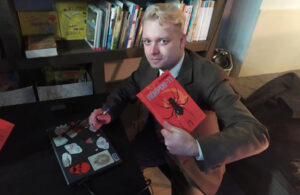 Alexander Pelevin was born in St. Petersburg in 1988. He is a prose writer, poet and journalist, and has been writing poetry since the age of eighteen. He studied at the Faculty of History of the St. Petersburg State University (he did not graduate); was the chief editor of the web site “Luna. Info”; worked as a security guard in a bookstore. Until 2020 he was a journalist in “Delovoy Petersburg”. Pelevin was shortlisted for the National Bestseller for the novel Четверо. In 2021 he won the National Bestseller Prize for the novel Pokrov-17.
Alexander Pelevin was born in St. Petersburg in 1988. He is a prose writer, poet and journalist, and has been writing poetry since the age of eighteen. He studied at the Faculty of History of the St. Petersburg State University (he did not graduate); was the chief editor of the web site “Luna. Info”; worked as a security guard in a bookstore. Until 2020 he was a journalist in “Delovoy Petersburg”. Pelevin was shortlisted for the National Bestseller for the novel Четверо. In 2021 he won the National Bestseller Prize for the novel Pokrov-17.
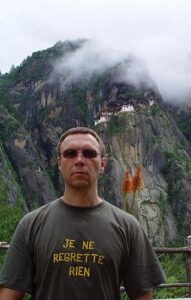
Victor Pelevin was born in 1962. Viktor Pelevin is one of the most prominent Russian writers, author of the novels Omon Ra, Chapaev and Emptiness, and Generation P, which have been translated into many languages. According to French literary critics, Pelevin is one of the most influential figures in contemporary culture. His novels interweave elements of science fiction, popular culture, and Eastern philosophy to create the most unexpected postmodern work. He holds a degree in electromechanical engineering from the Moscow Engineering Institute and attended creative writing seminars at the Maxim Gorky Literary Institute. His first novel, Omon Ra, was published in 1992, Blue Lantern won Russia’s first Small Booker Prize. Pelevin is the recipient of numerous literary awards, including the Russian National Bestseller Prize (2004). The esoteric motifs in Pelevin’s books are not accidental; the writer has studied Eastern culture and traveled to South Korea several times to live in a Buddhist retreat. In August 2020, the novel The Invincible Sun was published.
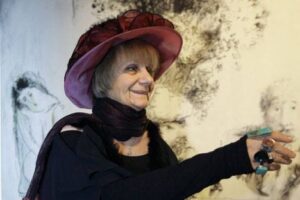
Lyudmila Petrushevskaya was born in 1938 in Moscow. Today, she is regarded as one of the most prominent Russian contemporary women writers and as one of the most famous Russian authors in the West. She is the author of more than fifteen collections of prose, including the New York Times bestseller There Once Was a Woman Who Tried to Kill the Neighbor’s Child: Scary Fairy Tales (2009). Her best-known novel, Time is Night, is a frank description of the lives of Russian women during the Soviet period. Her award-winning memoir, The Girl from Hotel Metropolis, is a memoir of her childhood, when she experienced extreme deprivation, roamed the streets and sang like a young Edith Piaf, asking for alms.

Vera Polozkova was born in Moscow in 1986. She started writing poetry at the age of five. She studied at Moscow State University. Polozkova gained fame through her poetry blog and video production, bringing poetry readings to the young cultural scene. Her first public performance was in 2007 in Moscow. Polozkova is the author of several books of poetry and the recipient of numerous literary awards, including the Neformat Prize. She represents contemporary pop culture in Russian poetry.
Andrei Polyakov was born in 1968 in Crimea. He holds a degree in philology from Tavrida National University. He was an editor with the Journal Review, a Crimean digest of Russian literature. Polyakov is the author of several books of poetry: Epistulae ex Ponto (1995), The Orthographic Minimum (2001), For Those Who Sleep (2003), The Chinese Descent (2010), Letter (2013), and America (2014). In his poetry, Polyakov has cultivated an image of a poet in exile on the outskirts of the empire, prompting critics to compare him to Ovid. Polyakov is a recipient of Russia’s top award in poetry, Andrei Bely Prize (2011) for his book of poetry Chinese Descent (2010).
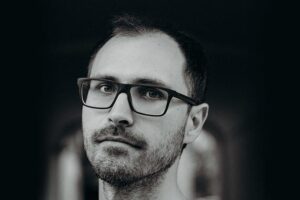 Alexey Polyarinov is one of Russia’s most promising young authors. He was born in 1986 and graduated from Novocherkassk Academy of Melioration. Polyarinov is a writer, translator, blogger, columnist and the author of the novels Landscape with the Fall of Icarus, (2017) and Centre of gravity, (2018). Polarinov’s novel The Reef (Риф) is a finalist for the Big Book Prize (2021). The novel by Polarinov is a study of modern sects. It’s almost a European-style novel and at the same time psychologically profound study of religious cults that blends ancient rituals with modernity,and hides mythological and mystical dimensions behind novelty.
Alexey Polyarinov is one of Russia’s most promising young authors. He was born in 1986 and graduated from Novocherkassk Academy of Melioration. Polyarinov is a writer, translator, blogger, columnist and the author of the novels Landscape with the Fall of Icarus, (2017) and Centre of gravity, (2018). Polarinov’s novel The Reef (Риф) is a finalist for the Big Book Prize (2021). The novel by Polarinov is a study of modern sects. It’s almost a European-style novel and at the same time psychologically profound study of religious cults that blends ancient rituals with modernity,and hides mythological and mystical dimensions behind novelty.
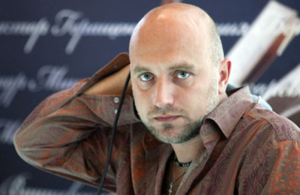 Zakhar Prilepin was born near Ryazan in 1975. Prilepin had extensive experience as a soldier with the Special Forces in Chechnya. His novel Sankya about a young rebel was based on his own experiences with young political extremists. It was shortlisted for the Russian Booker (2007). It also won the Yasnaya Polyana Award. His novel The Sin won the National Bestseller Prize in 2008. His recent epic novel Обитель (The Cloister), about life in the Solovki prison camp on the Solovetsky islands in 1920s, won the Big Book Prize in 2014. It is a compassionate story about prisoners trying to keep their humanity and dignity. Prilepin is often considered as one of the best Russian writers of the 21st century.
Zakhar Prilepin was born near Ryazan in 1975. Prilepin had extensive experience as a soldier with the Special Forces in Chechnya. His novel Sankya about a young rebel was based on his own experiences with young political extremists. It was shortlisted for the Russian Booker (2007). It also won the Yasnaya Polyana Award. His novel The Sin won the National Bestseller Prize in 2008. His recent epic novel Обитель (The Cloister), about life in the Solovki prison camp on the Solovetsky islands in 1920s, won the Big Book Prize in 2014. It is a compassionate story about prisoners trying to keep their humanity and dignity. Prilepin is often considered as one of the best Russian writers of the 21st century.
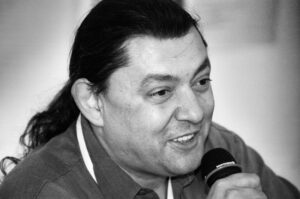
Vitaly Pukhanov was born in 1966 in Kiev. After serving in the Soviet Army, he graduated from the Maxim Gorky Literary Institute. He began publishing his poems in the early 1990s. In 1995, his first book, The Wooden Garden, was published in Moscow. After a stressful year in Kiev, where he was unemployed, Pukhanov returned to Moscow and worked for a literary magazine. Since 2003, he has been the executive secretary of the Debut Prize. He is the author of several books of poems, written mostly in traditional lyrical form. He lives in Moscow.
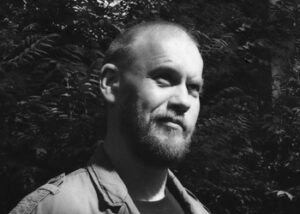
Andrei Rodionov was born in 1971. Rodionov is an outstanding figure in contemporary Russian poetic scene. His poetic career has begun in 2000s as a performer on poetry slams. In 2002, he was awarded the Russian Slam prize. He continues to be a leading figure in the Russian slam poetry movement today; in 2010, he organized the first national Russian slam final in Perm’. He is the author of seven books of poetry: Новая драматургия (New Dramaturgy) 2010; Игрушки для окраин (Toys for the Outskirts), 2007; Пельмени устрицы (Dumplings-Oysters), 2004 and others.
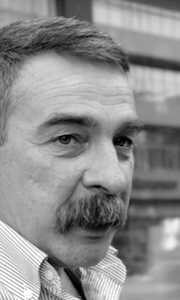 Viktor Remizov was born in 1958 in Saratov. After serving in military, Remizov studied at Moscow State University and worked as a school teacher and journalist. His latest novel, Vechnaya Merzlota (Permfrost), is a tragic recollection of the construction of the last Stalin’s railway in the Russia’s Arctic Circle in 1947-53, where thousands of gulag’s prisoners were working. By the time Stalin died in 1953, over 350 miles had been built but it was never completed. The river Enisey in the novel represents the symbolism of the frozen world of the labor camp where thousands of people were living and dying. This full-size Siberian epic has 820 pages. The novel was longlisted for 2021 national Bestseller Prize. Remizov lives in Moscow.
Viktor Remizov was born in 1958 in Saratov. After serving in military, Remizov studied at Moscow State University and worked as a school teacher and journalist. His latest novel, Vechnaya Merzlota (Permfrost), is a tragic recollection of the construction of the last Stalin’s railway in the Russia’s Arctic Circle in 1947-53, where thousands of gulag’s prisoners were working. By the time Stalin died in 1953, over 350 miles had been built but it was never completed. The river Enisey in the novel represents the symbolism of the frozen world of the labor camp where thousands of people were living and dying. This full-size Siberian epic has 820 pages. The novel was longlisted for 2021 national Bestseller Prize. Remizov lives in Moscow.
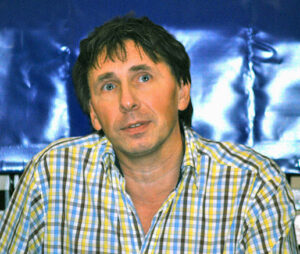 Valery Ronshin was born in 1962. He graduated with a degree in history from Petrozavodsk University in Karelia and continued his study at the Maxim Gorky Literary Institute in Moscow. He has started writing relatively late but broke into top literary magazines almost immediately. His stories are reminiscent of early Pelevin’s books. He lives in St. Petersburg.
Valery Ronshin was born in 1962. He graduated with a degree in history from Petrozavodsk University in Karelia and continued his study at the Maxim Gorky Literary Institute in Moscow. He has started writing relatively late but broke into top literary magazines almost immediately. His stories are reminiscent of early Pelevin’s books. He lives in St. Petersburg.
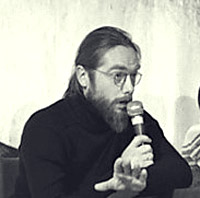 Arseny Rovinsky was born in 1968 in Kharkov, Ukraine and graduated from the Moscow Pedagogical Institute. He has lived in Copenhagen, Denmark since 1991. He made his debut in the Russian poetry scene in 1997. In 1999, Rovinsky released his first book of poems Collected Images. It was followed by the collections Exlra-dry (2004), All at Once together with Leonid Schwab and Feodor Svarovsky (2008), Winter Olympic Games (2009), Pearl Divers (2013), Unforgettable (2017), publications in anthologies Nine Dimensions and Ulysses Freed.
Arseny Rovinsky was born in 1968 in Kharkov, Ukraine and graduated from the Moscow Pedagogical Institute. He has lived in Copenhagen, Denmark since 1991. He made his debut in the Russian poetry scene in 1997. In 1999, Rovinsky released his first book of poems Collected Images. It was followed by the collections Exlra-dry (2004), All at Once together with Leonid Schwab and Feodor Svarovsky (2008), Winter Olympic Games (2009), Pearl Divers (2013), Unforgettable (2017), publications in anthologies Nine Dimensions and Ulysses Freed.
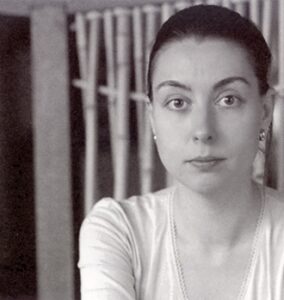
Maria Rybakova was born in 1973 in Moscow. She studied at Moscow University and Humboldt University, Germany and hold a Ph.D. from Yale. Rybakova is the author of the novels Anna Grom and her Ghost, The Fellowship of the Losers. Her novel Anna Grom and her Ghost was nominated for the Russian Booker prize. In 2011, she published Гнедич (Gnedich), a novel-in-verse about Russian poet Nikolai Gnedich, the first translator of The Iliad into Russian. The English translation of Gnedich by Elena Dimov was published in 2015. Rybakova’s novel Chernovik cheloveka was longlisted for the Russian Booker prize in 2015.
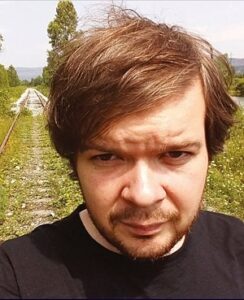 Kirill Ryabov was born in 1983 in St. Petersburg. After graduating from high school, he has changed many different jobs. He started writing prose when he was thirteen years old and started publishing at the age of 18. His work was mentioned in the longlist of the Debut Prize in 2007. Since then, his short novel Пёс (The Dog ) was nominated for the National Bestseller Prize (2020) and his new novel , 777, about a man who gets instantly rich when an ATM goes out of control, was nominated in 2022. Today, Ryabov is compared to Kharms and Camus. The novel 777 confirms this reputation. A sudden happy event – an ATM error, which gives the main character a fabulous amount of money – triggers a series of events, as scary as they are funny. Many critics have already noted similarities between the book and Guy Ritchie’s films about the “little man”. The story is both absurd and reminiscent of everyday life in Russia.
Kirill Ryabov was born in 1983 in St. Petersburg. After graduating from high school, he has changed many different jobs. He started writing prose when he was thirteen years old and started publishing at the age of 18. His work was mentioned in the longlist of the Debut Prize in 2007. Since then, his short novel Пёс (The Dog ) was nominated for the National Bestseller Prize (2020) and his new novel , 777, about a man who gets instantly rich when an ATM goes out of control, was nominated in 2022. Today, Ryabov is compared to Kharms and Camus. The novel 777 confirms this reputation. A sudden happy event – an ATM error, which gives the main character a fabulous amount of money – triggers a series of events, as scary as they are funny. Many critics have already noted similarities between the book and Guy Ritchie’s films about the “little man”. The story is both absurd and reminiscent of everyday life in Russia.
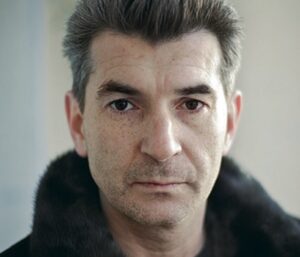
Andrey Rubanov was born in 1969 in the village Uzunovo near Moscow. His Do Time, Get Time, a semi-autobiographical book about his experience being in prison, was picked up by a publisher and shortlisted for the 2006 National Bestseller Prize. After Rubanov’s name was cleared, he worked in Chechnya as a press-secretary. His Barely a Drop was translated into English. His book Iodine (2010) combines realism with fantasy and anti-utopia. His novel Patriot was shortlisted for the Big Book Prize (2017). In 2019, Rybanov’s novel Finist-Iasnyi Sokol won the National Bestseller Prize.
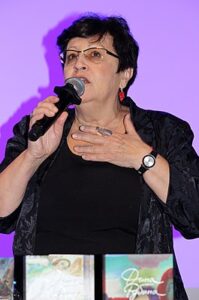
Dina Rubina was born in 1953 in Tashkent, Uzbekistan. She studied music at Tashkent Conservatory. After graduation in 1977, she began working at the Institute of Culture. In 1990, Rubina emigrated to Israel. Today, she is one of the most widely read Russian Israeli authors. Her life and adventures since 1990 are reflected in several of her novels. She is the author of almost twenty books. She lives in Israel but writes in Russian.
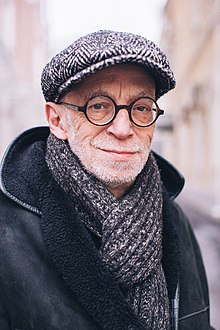
Lev Rubinstein (1947-2024) was a Russian essayist, journalist, poet, and social activist. He was a founder and member of Moscow Conceptualism. After graduating from Moscow State University, he worked as a librarian and bibliographer at his alma mater, where he encountered the library catalog cards that would inspire his famous “notecard poems.” Rubinstein became known for his “notecard poems,” in which each verse is presented on a separate notecard. These notecards emphasize the text as both an object and a unit of expression. To read a poem, the reader must interact visually with the text. An accomplished poet with a keen eye for unusual detail, Rubinstein was the winner of the prestigious Andrei Bely Prize. His books Catalog of Comedy Novels (2003) and Here I Am: Performance Poems (2002) have been translated into English.
German Sadulaev was born in 1973 in the town of Shali, Chechnya to a Chechen father and Cossack mother. In 1989 he left Chechnya to study law at Leningrad State University. Today, he lives and works as a lawyer in St Petersburg. His second book, I am a Chechen!, was nominated for the National Bestseller Prize.
Nina Sadur was born in 1950 in Novosibirsk. She came to Moscow in 1977 to study at the Maxim Gorky Literary Institute from which she graduated in 1983. Sadur demonstrates an extraordinary grasp of theatrical conditions in her plays: she both conforms to tradition and innovations. She has developed her own post-Soviet theater language. Her first play, Chudnaia baba (The Weird Peasant Woman, 1989) was very popular with the studio theaters that flourished in Moscow in the mid-1980s. This combination of Soviet reality with universal absurdity came to light when Vladimir Tumanov staged Chudnaia baba in Vilnius, Lithuania in 1988. In 2014, Sadur published The Witching Hour and Other Plays, noted by The Times Literary Supplement.
Igor Sakhnovsky was born in 1958 in the city of Orsk, Orenburg region. In 1981 he graduated from Ural State University and worked as a literary consultant. In 1999, “Novyi Mir” released his first novel Pressing Needs of the Dead. In 2000, the novel was nominated for the Apollon Grigoriev Prize. In 2002, it was translated into English and awarded the International Literary Prize. Sakhnovsky, is a novelist with a distinctive sense of eccentricity, and natural curiosity, and often blends realism and fantasy. His A Keen Feeling of Saturday: Eight First-Person Stories (2009) is a collection of stories based on curious retelling of real stories. His novel, The Man who Knew Everything was included in the list of finalists for the National Big Book Prize and Russian Booker.
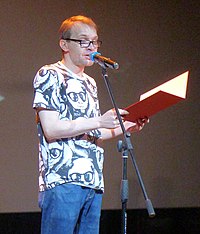
Aleksei Salnikov is a Russian writer and poet. Salnikov was born in 1978 in Tartu, Estonia, but the family moved to the Urals. He became famous with the publication of the novel The Petrovs in and around the flu (2018), which gained national fame and became one of the literary events of the year. It won the National Bestseller Award (2018). Salnikov’s new novel Оккульттрегер (Occulttrager) is written in the genre of urban fantasy. In the year 2019, in a small Ural town appeared – special beings – occulttragers. Literary critic Galina Yuzefovich writes: “In this story, mysticism comes to the fore: the main characters of the book are angels, demons and witches, who live in ordinary Russian apartments (khrushchevkas) and dream of a “normal” life.” It was shortlisted for the Big Book Prize 2023. Salnikov lives in Yekaterinburg.

Nikita Safonov is a poet and literary critic. He was born in 1989 in Omsk, Siberia and lived in Ryazan’. Ten years ago, he has moved to St. Petersburg, where he graduated from the Mining Institute, Department of Underground Space. He is the author of the book of poems Knots (Узлы, 2011). His poetry was published in the journals Translit, NLO, and Air, and on the websites TextOnly and Halftone. He was a participant in the “Poetronic” festival in Moscow and the 7th Annual May Festival of new poets. His vers libre poetry is striking with its absence of traditional meter and rhymes, but also with brilliant layered prosody. He lives in St. Petersburg.
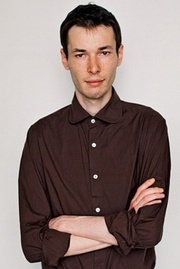 Sergey Samsonov was born in 1980 in Podolsk. He is the author of the novels The Leg (2007), Kamlaev Anomaly (2008), The Oxygen Limit (2009). In 2009, he was a finalist for the National Bestseller Prize. His novel Соколиный рубеж, about the epic confrontation between two air combat aces during World War II – the Soviet “Stalin Falcon” and the German pilot – was included in the long list of the 2017 National Bestseller Award. Sergei Samsonov is considered a major discovery of Russian literature in recent years.
Sergey Samsonov was born in 1980 in Podolsk. He is the author of the novels The Leg (2007), Kamlaev Anomaly (2008), The Oxygen Limit (2009). In 2009, he was a finalist for the National Bestseller Prize. His novel Соколиный рубеж, about the epic confrontation between two air combat aces during World War II – the Soviet “Stalin Falcon” and the German pilot – was included in the long list of the 2017 National Bestseller Award. Sergei Samsonov is considered a major discovery of Russian literature in recent years.
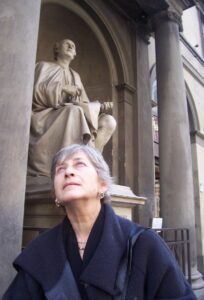
Olga Sedakova was born in 1949 in Moscow. She graduated from Moscow State University and earned her Ph.D. in Slavonic Mythology. Since 1991, she has lectured at Moscow State University. She became Chevalier d’ Honneur de l’ Ordre des Arts et des Lettres de la Republique Française in 2005. She was the winner of the Andrei Bely Prize (1983) for poetry, essays and poetry translations in samizdat. Sedakova is one of the most prominent poets in Russia today and also a literary scholar. Her collections The Silk of Time and Poems and Elegies have been translated to English.
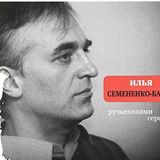
Ilya Semenenko-Basin was born in 1966 in Moscow and graduated from Moscow University. He began writing poetry very early in his adolescent years, but his first book of poetry, By the Streams of Silver, was published only in 2012. It was shortlisted for the Russian Gulliver’s Poetry Prize in 2014. He is a professor at the Center of Religious Studies at the University of Humanities in Moscow. Semenenko-Basin’s verse libre poetry is often laconic, but full of philosophical insight. It is always a thought clothed in the verse form, sometimes a sketch of the world around him – momentary and concise, a miniature in itself.
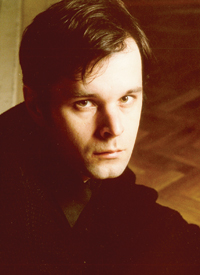 Roman Senchin was born in 1971 and grew up in Siberia. His family had to leave his native Tuva and move to Minusinsk as a result of the post-Soviet nationalist strife that broke out there. He recently moved to Moscow. Senchin is one of the most talented writers of his generation, the founder of so-called new realism. He wrote several novels and many short storie. Senchin wrote an excellent novel, The Eltyshevs, about an ordinary Russian family that is falling apart under new economic conditions. His novel Minus was translated into English by Arch Tait. Senchin’s novel The Flood Zone is an homage to Valentin Rasputin’s Parting with Matera. The novel is set in modern Siberia and tells the story of the tragic fate of Siberian villagers. It won third place in the Big Book Award (2015) Senchin is the winner of several prestigious literary prizes.
Roman Senchin was born in 1971 and grew up in Siberia. His family had to leave his native Tuva and move to Minusinsk as a result of the post-Soviet nationalist strife that broke out there. He recently moved to Moscow. Senchin is one of the most talented writers of his generation, the founder of so-called new realism. He wrote several novels and many short storie. Senchin wrote an excellent novel, The Eltyshevs, about an ordinary Russian family that is falling apart under new economic conditions. His novel Minus was translated into English by Arch Tait. Senchin’s novel The Flood Zone is an homage to Valentin Rasputin’s Parting with Matera. The novel is set in modern Siberia and tells the story of the tragic fate of Siberian villagers. It won third place in the Big Book Award (2015) Senchin is the winner of several prestigious literary prizes.
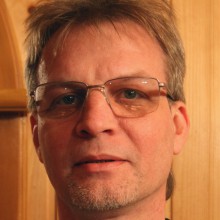 Andrei Sen-Sen’kov was born in Tajikistan in 1968. He has received a degree in medicine from Yaroslavl’s State Medical Academy, then lived in Borisoglebsk before settling in Moscow in 2001. After his first book of poetry appeared in 1992, he has become one of the foremost figures in Russian verse libre poetry. He also works with visual poetry and collaborates with visual artists and filmmakers such as Peter Greenaway. Sen-Sen’kov has published seven books of poetry, prose poems and visual poetry and won the Andrei Belyi Prize in 2018.
Andrei Sen-Sen’kov was born in Tajikistan in 1968. He has received a degree in medicine from Yaroslavl’s State Medical Academy, then lived in Borisoglebsk before settling in Moscow in 2001. After his first book of poetry appeared in 1992, he has become one of the foremost figures in Russian verse libre poetry. He also works with visual poetry and collaborates with visual artists and filmmakers such as Peter Greenaway. Sen-Sen’kov has published seven books of poetry, prose poems and visual poetry and won the Andrei Belyi Prize in 2018.
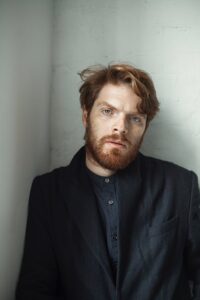
Grigory Sluzhitel was born in 1983 in Moscow. He is an actor, singer and writer. He graduated from the State Institute of Theatre Arts (GITIS) in 2005. Currently, he is an actor at the Studio of Theatre Arts and lead singer of the O’Casey Band. He became famous for his debut novel Savely’s Days. It is a bittersweet story of the cat called Savely, and the people around him, but above all it is a universal tale about great love and parting. It let him win the Readers Choice Award at Yasnaya Poliana. Savely’s Days was recommended by Evgeny Vodolazkin and was shortlisted for the Big Book Prize in 2020.
Sasha Sokolov is considered one of the premier writers of the post-Soviet period in 90s. He was born in 1943 in Ottawa where his father worked at the Soviet embassy. He graduated from Moscow State University with a degree in journalism. He emigrated from the Soviet Union in 1975 and moved to Canada. His book Shkola dlia durakov ( A School for Fools) is a narrative about a boy’s life. In 1996 he received the Pushkin Prize for his literary works.
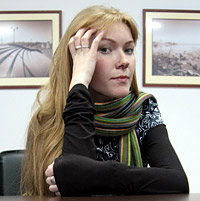
litkarta.ru
Ekaterina Sokolova was born in 1983 in Syktyvkar. She graduated from the Department of Philology of the Syktyvkar State University. Sokolova is the author of four books of poetry. Her poems are translated into English, Italian, French. Poems translated into Italian were published in anthology of contemporary Russian poetry La massa critica del cuore (2013). She was the winner of the Moskovsky Schet Award (2014) and the Debut Literary Prize (2009), and was short-listed for the Andrey Bely Prize (2016). She was also a Joseph Brodsky Fund Fellow in poetry in Fall-2017. She lives and works in Moscow.
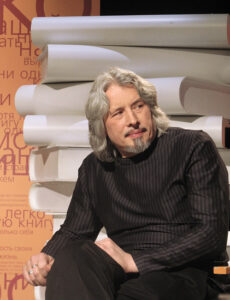
Vladimir Sorokin is one of the most popular writers in the postmodern Russia. He was born in 1955 in a small town outside of Moscow. Sorokin was trained as an engineer at the Moscow Institute of Oil and Gas, but turned to art and writing, becoming a major presence in the Moscow underground of the 1980s. His work was banned in the Soviet Union, and his first novel, The Queue, was published by dissident Andrei Sinyavksy in France in 1983. His famous and controversial novel Blue Lard won the National Booker Prize in 2001. His 2006 novel, Day of the Oprichnik, describes a dystopian Russia in 2027, with a Tzar in the Kremlin, a Russian language with numerous Chinese expressions, and a “Great Russian Wall” separating the country from its neighbors. In 2015 he was awarded the Premio Gregor von Rezzori Prize for this novel. His novel Telluriya was published in 2013. Doctor Garin, the writer’s latest novel, is the next chapter in his dystopian projection of Russia.
Viktor Sosnora (1936-2019) is considered one of the most important representatives of the Leningrad/Petersburg school of poetry. He is also known as one of the most experimental of Russian poets, and one of the foremost translators of Catullus, Oscar Wilde, Edgar Allan Poe, and Allen Ginsberg into Russian. His poetry is characterized by distinctive irony. Sosnora was born in Alupka, Crimea but lived almost all his life in St. Petersburg. When World War II broke out, Sosnora spent a year under the blockade of Leningrad before being evacuated from Leningrad to a region in the south of the Soviet Union through the “Road of Life”. His first book was published in 1962. Sosnora for many years lectured in Paris and the United States. His book of poetry The January Downpour was published in 1989. Sosnora was the Russian Poet Laureate in 2012.
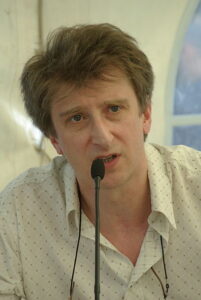 Alexandr Skidan was born in Leningrad in 1965. He is a poet, critic, essayist, and translator. He attended The Free University, while working as a stoker in a boiler house (1985–2002). His poetry collections include Delirium (1993), In the Re-Reading (1998), Red Shifting (2005), Dissolution (2010) and Membra disjecta (2015). In 2006 Red Shifting was published in the USA. In 2006, he won the Andrei Bely Prize for Red Shifting. In 2018, he was awarded the Joseph Brodsky Memorial Fellowship in poetry and spent the fall in Rome and Venice. He is the co-editor of the New Literary Observer magazine and lives in St. Petersburg.
Alexandr Skidan was born in Leningrad in 1965. He is a poet, critic, essayist, and translator. He attended The Free University, while working as a stoker in a boiler house (1985–2002). His poetry collections include Delirium (1993), In the Re-Reading (1998), Red Shifting (2005), Dissolution (2010) and Membra disjecta (2015). In 2006 Red Shifting was published in the USA. In 2006, he won the Andrei Bely Prize for Red Shifting. In 2018, he was awarded the Joseph Brodsky Memorial Fellowship in poetry and spent the fall in Rome and Venice. He is the co-editor of the New Literary Observer magazine and lives in St. Petersburg.
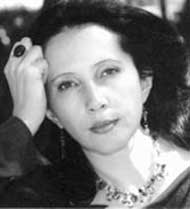 Olga Slavnikova graduated from Yekaterinburg State University in 1981 and began writing fiction in the late 1980s. She was the editor, then managing editor of the literary magazine “Ural”. Her first novel, A Dragonfly Enlarged to the Size of a Dog, made the short list for the Russian Booker Prize in 1997; it immediately raised her to the top ranks of Russian literature. She has received the Apollon Grigoriev Prize, the Polonsky Prize, the Bazhov Prize. Her magnum opus, 2017, won the Russian Booker prize in 2006 and was translated into English but the translation did not reproduce the original’s merit. Slavnikova’s Прыжок в длину (Long Jump) won the Yasnaya Polyana Award (2018) and was the finalist for the Big Book Prize. Olga Slavnikova lives in Moscow.
Olga Slavnikova graduated from Yekaterinburg State University in 1981 and began writing fiction in the late 1980s. She was the editor, then managing editor of the literary magazine “Ural”. Her first novel, A Dragonfly Enlarged to the Size of a Dog, made the short list for the Russian Booker Prize in 1997; it immediately raised her to the top ranks of Russian literature. She has received the Apollon Grigoriev Prize, the Polonsky Prize, the Bazhov Prize. Her magnum opus, 2017, won the Russian Booker prize in 2006 and was translated into English but the translation did not reproduce the original’s merit. Slavnikova’s Прыжок в длину (Long Jump) won the Yasnaya Polyana Award (2018) and was the finalist for the Big Book Prize. Olga Slavnikova lives in Moscow.
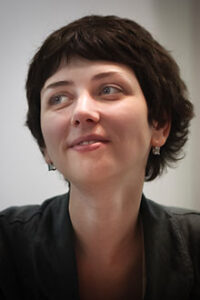
Anna Starobinets was born in Moscow in 1978 and graduated from Moscow State University. She writes in the genre of “intellectual fantasy.” In 2005, Starobinets published her debut collection of strange stories Awkward Age. Today, Starobinets is often described as the Russian successor to Stephen King, writing science fiction and horror stories. Being under-represented in Russian literature, this genre is very popular in the West and many her books have been translated into English.
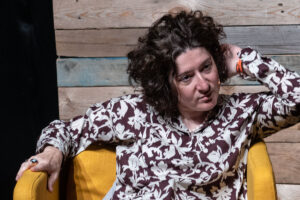
Maria Stepanova is among the most notable figures on the contemporary Russian literary scene. She is a poet and well-known journalist, one of the founders and publishers of OpenSpace.ru and Colta.ru. Stepanova was born in Moscow in 1977 and graduated from the Maxim Gorky Literary Institute. She is the author of several books of poetry and prose and two volumes of essays. Her books include Songs of the Northern Southerners, Happiness, In Memory of Memory (2017), and others. Her long poem Prose of Ivan Sidorov, first published online in 2006, has been staged. Her poetry is a wonderful example of the modern epic ballad. She is the recipient of numerous Russian and international awards for her poetry, including the Joseph Brodsky Foundation Memorial Scholarship (2010). Maria Stepanova, one of the most powerful voices of contemporary Russian literature, now lives in exile in Berlin. She was awarded the prestigious Leipzig Book Fair Prize for European Understanding in 2023.
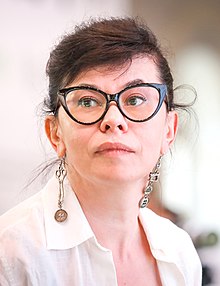 Marina Stepnova was born in 1971 in the small town of Efremov, in the Tula region. Stepnova was raised in Moscow, where she now lives. She graduated from the Maxim Gorky Literary Institute and did postgraduate studies at the Institute of World Literature. She is a translator from Romanian. Stepnova’s translation of Nameless Star by Mikhail Sebastien has been staged by numerous theaters throughout Russia. Her debut novel, The Surgeon, was published in 2005 then re-released in 2012. Stepnova’s second novel, The Lazarus’s Women, was nominated for the National Bestseller prize in 2012. It is written in a genre of family saga. Her third novel, The Italian Lessons (Безбожный переулок), came out in 2014. The Garden, Stepnova’s new novel about the life of fictional Princess Boryatinskaya’s daughter in the mid-nineteenth century, was short-listed for the Big Book Award (2021).
Marina Stepnova was born in 1971 in the small town of Efremov, in the Tula region. Stepnova was raised in Moscow, where she now lives. She graduated from the Maxim Gorky Literary Institute and did postgraduate studies at the Institute of World Literature. She is a translator from Romanian. Stepnova’s translation of Nameless Star by Mikhail Sebastien has been staged by numerous theaters throughout Russia. Her debut novel, The Surgeon, was published in 2005 then re-released in 2012. Stepnova’s second novel, The Lazarus’s Women, was nominated for the National Bestseller prize in 2012. It is written in a genre of family saga. Her third novel, The Italian Lessons (Безбожный переулок), came out in 2014. The Garden, Stepnova’s new novel about the life of fictional Princess Boryatinskaya’s daughter in the mid-nineteenth century, was short-listed for the Big Book Award (2021).
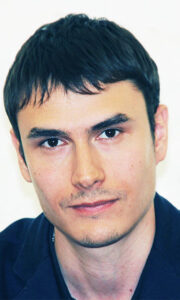 Sergei Shargunov was born in 1980 into the family of a Russian Orthodox priest. He is a graduate of Moscow State University with a degree in international journalism. Since then, he has reported from different locations including Chechnya and South Ossetia. In Russia, Shargunov earned a reputation of writer with a social conscience. Since 2000, Shargunov works at the literary magazine “Novyi Mir”. In 2016, he became the member of Russian Duma. Shargunov is the editor- in-chief of the website Svobodnaia Pressa. He is the winner of the Debut Prize for his novel Malish nakazan (The Child is Corrected). His Book Without Photographs was shortlisted for the National Bestseller Prize and was a contender for the Big Book Prize
Sergei Shargunov was born in 1980 into the family of a Russian Orthodox priest. He is a graduate of Moscow State University with a degree in international journalism. Since then, he has reported from different locations including Chechnya and South Ossetia. In Russia, Shargunov earned a reputation of writer with a social conscience. Since 2000, Shargunov works at the literary magazine “Novyi Mir”. In 2016, he became the member of Russian Duma. Shargunov is the editor- in-chief of the website Svobodnaia Pressa. He is the winner of the Debut Prize for his novel Malish nakazan (The Child is Corrected). His Book Without Photographs was shortlisted for the National Bestseller Prize and was a contender for the Big Book Prize
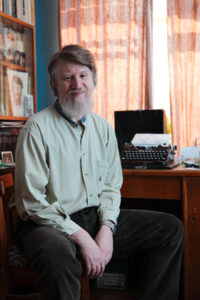
Vladimir Sharov (1952 – 2018) was a Russian novelist who was awarded the Russian Booker Prize in 2014 for his novel Return to Egypt (Возвращение в Египет). He graduated from Voronezh University with a degree in history. In 1984, Sharov defended his thesis on the history of the Ivan the Terrible’s secret police, the Oprichnina. His first novel was published in 1991. Возвращение в Египет (Return to Egypt), was shortlisted for the Big Book Prize, Russia’s most prestigious literary award, and won the Russian Booker Prize a few months later. Its hero, a Soviet agronomist by the name of Nikolai Gogol, the descendant of the great Russian writer of the same name, takes upon himself the task of completing his ancestor’s unfinished masterpiece, Dead Souls, and leading the Russian people to salvation. Sharov follows the historical journey of Soviet generation whose lives are correlated to the Book of Exodus – hence the novel’s title. He is the author of Rehearsals (2018), an astonishing reflection on art, history, religion, and Russian national identity. It was at the New Jerusalem Monastery in seventeenth-century Moscow that Patriarch Nikon attempted to stage the “New Testament.”
Tatiana Shcherbina was born in 1954. She graduated from Moscow State University. Shcherbina published six books in samizdat (unofficial literature) before 1986.Between 1992 and 1997, Shcherbina lived in Paris and Munich where she continued to write poetry and prose, translated poems from French into Russian, and worked for Radio Liberty. Her original work has been widely translated and included in many of the premiere volumes of contemporary Russian poetry.
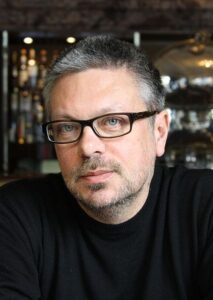 Mikhail Shishkin is a Russian-Swiss writer and the only author to have won the Russian Booker Prize (2000), the Russian National Bestseller (2005), and the Big Book Prize (2010). He was born in 1961 in Moscow. Shishkin has worked as a schoolteacher and journalist before his immigration to Switzerland in 1995. His Venus Hair (Maiden’s Hair) received both the National Bestseller Prize and the Big Book Prize. Living in Switzerland since 1995, he has not returned to Russia since 2014. Shishkin considers himself a Russian writer and continues to be published in Russia even after his questionable “stolen language” letter was published. He is considered a writer of postmodern prose, and his writings are sophisticate in nature and certainly overrated by Westerners.
Mikhail Shishkin is a Russian-Swiss writer and the only author to have won the Russian Booker Prize (2000), the Russian National Bestseller (2005), and the Big Book Prize (2010). He was born in 1961 in Moscow. Shishkin has worked as a schoolteacher and journalist before his immigration to Switzerland in 1995. His Venus Hair (Maiden’s Hair) received both the National Bestseller Prize and the Big Book Prize. Living in Switzerland since 1995, he has not returned to Russia since 2014. Shishkin considers himself a Russian writer and continues to be published in Russia even after his questionable “stolen language” letter was published. He is considered a writer of postmodern prose, and his writings are sophisticate in nature and certainly overrated by Westerners.
Elena Shvarts (1948-2010) was one of the leaders of the Leningrad underground culture of the 1970s and 1980s. She was born in Leningrad and lived there all her life. Shvarts studied at the University of Tartu, where her first poems were published in the university newspaper in 1973. Her work began to appear in émigré magazines in 1978. She published two collections of poetry, Dancing David and Stikhi, and a novel in verse,The Labor and Days of Lavinia, abroad before the collection was allowed for publication in the Soviet Union, “which brought her immediate recognition both at home and abroad. The collected works of Elena Schwartz were published by the Pushkinskii Fund in 2002-08.
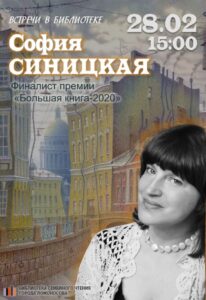
Sofia Sinitskaya was born in Peterhof in 1972. She graduated from St. Petersburg University in 1995. Her first book of prose was published in 2013, but it was not until 2020 that her book The Shining of the Zhemozhakha (Сияние “Жеможаха”) became a finalist for two major literary prizes, “National Bestseller” and “The Big Book”, and aroused great interest among readers and critics. According to the publisher, it is a book about the Great Patriotic War, repressions, the siege of Leningrad. Literary critic Marina Kronidova writes: “The language is unusually dense, lively, metaphorical, but the author’s philological skill does not let it overflow, and this is a stylistic feature of Sinitskaya’s prose, as well as a wonderful humor.” The book Хроника Горбатого (The Chronicle of the Hunchback) was shortlisted for the National Bestseller – 2022. It combines history and fiction, the main “hero” of the story is the city of Vyborg – from the time of its foundation by the Swedes to the present day.
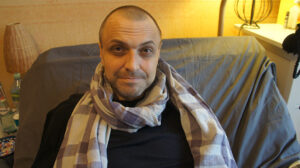
Fedor Svarovsky was born in 1971 and immigrated to Denmark at the age of 19, where he received refugee status and lived for six years. In 1997, he returned to Moscow and continued to work as a journalist. His first book of poetry Everyone Wants to Be a Robot (Все хотят быть роботами) was shortlisted for the Andrei Bely Prize (2007) and received the Moscow Account Minor Prize. He is the author of Time Travelers (Puteshestvenniki vo vremeni, 2009), Glory to Heroes (Slava Geroyam, 2015) and other books. In 2011, Svarovsky participated in PEN’s New Voices reading series in NYC. He is the author of notable “New Epos Manifesto” (2008) and one of the leaders of the “new epic ” literary movement in Russia. He lives in Montenegro.
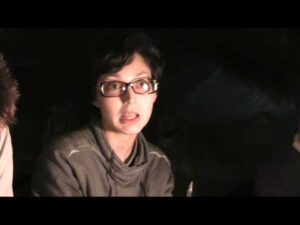
Eugenia Suslova was born in 1986 in Nizhny Novgorod and graduated from Nizhny Novgorod University. She holds a Ph.D. from St. Petersburg State University. She worked at the Moscow International Film School and at the Children’s Literature Publishing House. She is a representative of the so-called “Internet” poetry, which aims to attract the reader’s attention through the use of language juxtaposition. As a result, these verses are difficult to understand, but some critics consider them innovative. A poem about salamanders is used for her profile in the New Map of Russian Literature. Suslova’s book Svod Mashtaba (2013) was nominated for the Andrey Bely Prize. Animal (Животное) was published in 2016. She lives in Nizhny Novgorod.
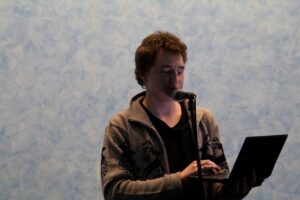
Nikita Sungatov is a poet and literary critic. He was born in 1992 in Prokopyevsk, a small mining town in Siberia, and studied at the Maxim Gorky Literary Institute. Since 2010 he has been publishing his poetry in the literary magazines “Air”, “NLO” and “Translit.”His poetry is characterized by a refusal of the individual voice, epic narrative, and brilliant linguistic tools. All together it creates a unique poetic style. In 2015, Sungatov published his first collection of poetry, Young Poet’s Debut Book, about the daily struggles of a talented and restless youth. With its dry humor, literary value and political undertones, it aroused great interest among young readers.
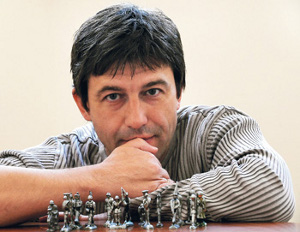 Alexander Terekhov was born in 1966 in the provincial city of Tula, south of Moscow. After graduating from Moscow State University, he served in the Soviet security forces. Later, Terekhov worked as a reporter. During this time, he began to gain recognition for his literary dissection of military life and his portrayal of the chaos that perestroika brought to provincial Russia. His novel The Rat Killer was published in 1997. Terekhov’s novel The Stone Bridge, dedicated to the secrets of Stalin’s Moscow, won second place in the 2009 Big Book Awards. In 2012, his novel The Germans won the National Bestseller Award. His subtle satire has often been compared to that of Saltykov-Schedrin, and Terekhov is considered one of Russia’s finest novelists.
Alexander Terekhov was born in 1966 in the provincial city of Tula, south of Moscow. After graduating from Moscow State University, he served in the Soviet security forces. Later, Terekhov worked as a reporter. During this time, he began to gain recognition for his literary dissection of military life and his portrayal of the chaos that perestroika brought to provincial Russia. His novel The Rat Killer was published in 1997. Terekhov’s novel The Stone Bridge, dedicated to the secrets of Stalin’s Moscow, won second place in the 2009 Big Book Awards. In 2012, his novel The Germans won the National Bestseller Award. His subtle satire has often been compared to that of Saltykov-Schedrin, and Terekhov is considered one of Russia’s finest novelists.
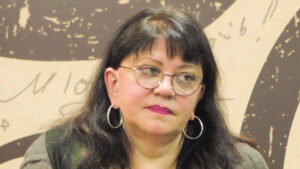 Tatiana Tolstaya is a writer, TV host, publicist, novelist, and essayist. She was born in Leningrad in 1951. After completing a degree in philology at Leningrad State University, Tolstaya worked for several years at a Moscow publishing house. In the mid-1980s, she began publishing short stories in literary magazines and her first story collection On the Golden Porch established her as one of the foremost writers of the “perestroika” and post-Soviet period. She spent much of the late 80-90s living in the United States and teaching at several universities. Her novel The Slynx (Кысь, 2000) is a dystopian vision of post-nuclear Russian life. For twelve years, from 2002 to 2014, Tolstaya co-hosted the Russian reality television show School for Scandal (Школа злословия).
Tatiana Tolstaya is a writer, TV host, publicist, novelist, and essayist. She was born in Leningrad in 1951. After completing a degree in philology at Leningrad State University, Tolstaya worked for several years at a Moscow publishing house. In the mid-1980s, she began publishing short stories in literary magazines and her first story collection On the Golden Porch established her as one of the foremost writers of the “perestroika” and post-Soviet period. She spent much of the late 80-90s living in the United States and teaching at several universities. Her novel The Slynx (Кысь, 2000) is a dystopian vision of post-nuclear Russian life. For twelve years, from 2002 to 2014, Tolstaya co-hosted the Russian reality television show School for Scandal (Школа злословия).
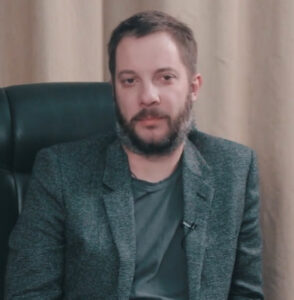
Alexander Tsypkin is one of the most recent literary discoveries. Born in 1975 in St. Petersburg, he made his literary debut online in 2015 and is an author, producer, screenwriter, and philanthropist. He is best known for his four collections of short stories. Currently, his theatrical and literary project “Unprincipled Readings” is selling out venues in Russia and abroad. In recent interviews, he has stressed the importance of writing about what interests him: “It turns out that there is a deep meaning that I did not expect”. His Дом до свиданий (2018) became one of the top 10 bestsellers in Russia in 2018.
Alexey Tsvetkov was born in Ukraine in 1947. He studied history at Moscow State University, and hold a Ph.D. in philology from Michigan State University. In 1975, he became a founding member of the Moscow Time group of poets, which also included Bakhyt Kenzheev, Alexander Soprovsky and Sergey Gandlevsky. Tsvetkov immigrated to the USA in 1975. He worked for the Voice of America and radio Svoboda as a radio journalist. His first three collections were published in the USA. In 1996, the book entitled Poems was published in St. Petersburg. Currently he lives in Israel.
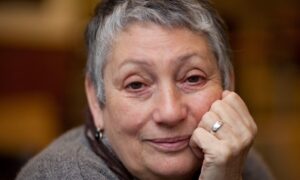 Lyudmila Ulitskaya was born in 1943 in the Urals and graduated from Moscow State University with a degree in biology. Several years she worked in the Institute of Genetics as a scientist. She made her literary debut in the early 1990’s with a collection of short stories. Ulitskaya was the first woman to win the Russian Booker prize for her controversial novel Kazus Kukotskogo (2001). Her works have been translated into several languages. Her Yakov’s Ladder (Лестница Якова, 2015) was nominated for the Big Book Prize in 2016.
Lyudmila Ulitskaya was born in 1943 in the Urals and graduated from Moscow State University with a degree in biology. Several years she worked in the Institute of Genetics as a scientist. She made her literary debut in the early 1990’s with a collection of short stories. Ulitskaya was the first woman to win the Russian Booker prize for her controversial novel Kazus Kukotskogo (2001). Her works have been translated into several languages. Her Yakov’s Ladder (Лестница Якова, 2015) was nominated for the Big Book Prize in 2016.
Andrei Usachev was born in 1958 in Moscow. He attended Moscow Institute of Electronics but left to study humanities at Tver State University. He is the author of books for children. In 2005, he won the Book of the Year Prize (children’s).
Tatiana Ustinova has published close to 30 novels and is one of the most popular Russian crime fiction authors.
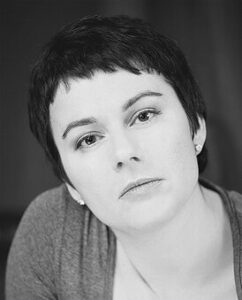
Yana Wagner was born in Moscow in 1973 into a bilingual family. Her mother came to the USSR from Czechoslovakia in the 60’s to study Russian language and literature. After graduating from the Russian State University for the Humanities in 1994, Yana worked as a Czech-English translator and spent more than a decade in transportation logistics. She became known for her debut anti-utopian novel, Vongozero (2011). The novel was shortlisted for the NOS and National Bestseller literary awards. It has since become a bestselling novel, translated into multiple languages and adapted into a Netflix series
The sequel to Vongozero, the novel Living People, was published in 2013. It was on the longlist for the National Bestseller. The novel Who Did Not Hide (2017) is written in the genre of the hermetic detective. It was nominated for the Big Book, Yasnaya Polyana and National Bestseller. Her latest book Tunnel is nominated for the Big Book Prize 2023-24. Vagner lives near Moscow with her husband, teenage son and three dogs.
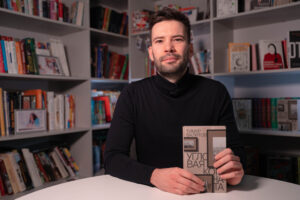
Timur Valitov was born in Nizhny Novgorod in 1991. Having earned a degree in corporate law, he is currently studying for his master’s degree at the Higher School of Economics in Moscow in the Creative Writing program. His literary texts have already won awards and have been published in Russian literary magazines. Valitov is a finalist for the Lyceum Award. In 2021, Elena Shubina published Valitov’s debut novel The Corner Room. Timur Valitov lives in Moscow, where he works as a copywriter for an IT company.
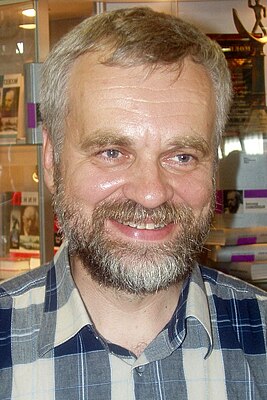
Alexei Varlamov was born in Moscow in 1963. He graduated from the Faculty of Philology of Moscow State University (1985). He defended his M.A. thesis “Apocalyptic Motifs in Russian Prose of the Late 20th Century” (1997) and his Ph.D. thesis “Life as Creativity in the Diary and Prose of M.M. Prishvin” (2003). Currently, he is a professor in the Department of the History of Modern Russian Literature at Moscow State University and also teaches at the Literary Institute. Varlamov’s novel September Eleventh (Одиннадцатое сентября) (2003) received mixed reviews from critics. In 2014, the novel Myslennyi Volk was published, which the author described as “a personal attempt to talk about the Silver Age”. Varlamov is a prose writer who is best known for his biographies of writers, including Aleksey Tolstoy, Mikhail Bulgakov, Mikhail Prishvin, and Andrei Platonov. He is the permanent author of the series “Lives of Remarkable People”. In 2022 he was shortlisted for the Big Book Award for his work The name of Rozanov (Имя Розанова) about the life of one of the most mysterious and controversial figures of the Silver Age, the thinker and writer Vasily Rozanov.
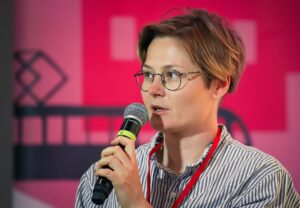
Oxana Vasyakina was born in 1989 in the city of Ust-Ilimsk, Siberia into a working-class family. She wrote her first poetic text at the age of 14. In 2016, she graduated from the Maxim Gorky Literary Institute. Vasyakina is a participant of poetry festivals and slams in Novosibirsk, Perm, Vladimir, and Moscow. Her work has been published in the journal Vozdukh, on websites Colta.ru, TextOnly, and others. The first book of poems Women’s Prose was published in 2016. In 2017, she wrote a cycle of poetic texts Wind of Fury, published by the AST publishing house in 2019 in the series “Female Voice”. Based in Moscow, the 31-year-old now runs a creative writing studio, and organizes meetings and poetry readings in support of gender activists.
Dmitry Vedenyapin was born in 1958 in Moscow. He graduated from Moscow State Pedagogical Institute of Foreign Languages. Vedenyapin is the author of four poetry collections. He won the Big Moscow Count Poetry Prize for the book Mezhdu shkafom i nebom (Between the wardrobe and the sky) in 2010, and became Joseph Brodsky Memorial Fellow in 2011.
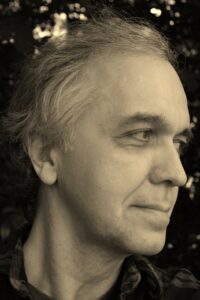 Igor Vishnevetsky was born in 1964 in Rostov-on-Don. Originally aspired to become a composer, he studied at Rostov State Conservatory, before attending Moscow State University to pursue a degree in philology. In 1986 he graduated from the Faculty of Philology at Moscow State University, and in 1996 received a PhD in Slavic languages from Brown University (USA). Subsequently, he taught at Emory University for five years. Vishnevetsky has authored six collections of poetry and two monographs on Andrei Bely (2000) and Russian émigré composers of the 1920’s and 1930’s (2005). In 2011 his novel Leningrad about the German siege of the city during WWII won the NOS Prize. It is an extraordinary mixture of prose and poetry, snippets from private letters and diaries, quotes from papers and the NKVD documents. Vishnevetsky divides his time between the United States and Russia.
Igor Vishnevetsky was born in 1964 in Rostov-on-Don. Originally aspired to become a composer, he studied at Rostov State Conservatory, before attending Moscow State University to pursue a degree in philology. In 1986 he graduated from the Faculty of Philology at Moscow State University, and in 1996 received a PhD in Slavic languages from Brown University (USA). Subsequently, he taught at Emory University for five years. Vishnevetsky has authored six collections of poetry and two monographs on Andrei Bely (2000) and Russian émigré composers of the 1920’s and 1930’s (2005). In 2011 his novel Leningrad about the German siege of the city during WWII won the NOS Prize. It is an extraordinary mixture of prose and poetry, snippets from private letters and diaries, quotes from papers and the NKVD documents. Vishnevetsky divides his time between the United States and Russia.
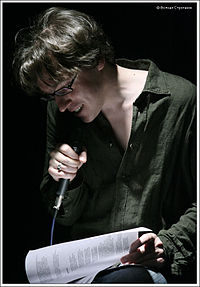 Dmitry Vodennikov is a poet, radio host and essayist. In 2002, he was named one of the top ten best living Russian poets. He was born in 1968 in Moscow, and graduated from Moscow State Pedagogical Institute. After graduation, he worked as a teacher. He continues his humanitarian mission today by helping a children’s foundation. Vodennikov is considered to be a leader of the “New Sincerity” movement in Russian literature. He is the author of several volumes of poetry: Tchernovik, 2006, Promise (Obeshanie, 2011), and Hello, I’ve come to bid you farewell (Zdravstvyite, ya prishel s vami poproschatsya) – an autobiographical novel (2007). For a number of years, Vodennikov has been hosting radio shows about contemporary Russian literature including “Notes from a Neophyte,” “From One’s Own Angle” (Своя колокольня), and “Poetic Minimum.
Dmitry Vodennikov is a poet, radio host and essayist. In 2002, he was named one of the top ten best living Russian poets. He was born in 1968 in Moscow, and graduated from Moscow State Pedagogical Institute. After graduation, he worked as a teacher. He continues his humanitarian mission today by helping a children’s foundation. Vodennikov is considered to be a leader of the “New Sincerity” movement in Russian literature. He is the author of several volumes of poetry: Tchernovik, 2006, Promise (Obeshanie, 2011), and Hello, I’ve come to bid you farewell (Zdravstvyite, ya prishel s vami poproschatsya) – an autobiographical novel (2007). For a number of years, Vodennikov has been hosting radio shows about contemporary Russian literature including “Notes from a Neophyte,” “From One’s Own Angle” (Своя колокольня), and “Poetic Minimum.
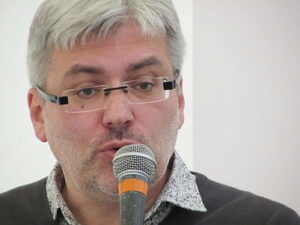 Evgenii Vodolazkin was born in 1964 in Kiev. He is a recognized expert on medieval Russian history and folklore, having authored numerous scholarly articles. Vodolazkin has been working in the Department of Old Russian Literature of the Pushkin House since 1990. Vodolazkin came to prominence with his debut novel, Solovyov and Larionov, which was popular with readers and critics alike. It was nominated for both the Andrei Bely Prize (2009) and the Big Book Award (2010). Vodolazkin’s Lavr (Laurus), about the life of the fictional St. Arseny, is a famous postmodern novel. It was awarded the Big Book Prize -2013. It has been translated into English by Lisa Espenschade. Two other critically acclaimed novels, The Aviator and Brisbane, have also been translated into English. In 2020, he published a novel about a mysterious island that doesn’t appear on any maps, Justification of the Island. It was shortlisted for the Big Book Prize-2021. His new novel, Chagin, won the Big Book Prize -2022/23. Vodolazkin lives in St. Petersburg.
Evgenii Vodolazkin was born in 1964 in Kiev. He is a recognized expert on medieval Russian history and folklore, having authored numerous scholarly articles. Vodolazkin has been working in the Department of Old Russian Literature of the Pushkin House since 1990. Vodolazkin came to prominence with his debut novel, Solovyov and Larionov, which was popular with readers and critics alike. It was nominated for both the Andrei Bely Prize (2009) and the Big Book Award (2010). Vodolazkin’s Lavr (Laurus), about the life of the fictional St. Arseny, is a famous postmodern novel. It was awarded the Big Book Prize -2013. It has been translated into English by Lisa Espenschade. Two other critically acclaimed novels, The Aviator and Brisbane, have also been translated into English. In 2020, he published a novel about a mysterious island that doesn’t appear on any maps, Justification of the Island. It was shortlisted for the Big Book Prize-2021. His new novel, Chagin, won the Big Book Prize -2022/23. Vodolazkin lives in St. Petersburg.
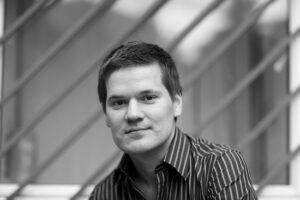
Valery Votrin was born in 1974 in Tashkent into a Russian family. He studied English Language and Literature at the Department of Germanic and Romance Studies at Tashkent State University. He has lived in Belgium since 2000, where he received a M.S. in Human Ecology and a Ph.D. in Environmental Sciences from the Free University of Brussels. He has worked as an environmental consultant. At the same time, he translated and published short stories by Flann O’Brien, T. F. Powys, and Eric Stenbock as well as numerous poems by the 17th – 20th century English and Scottish poets. Votrin began publishing short stories and novels in 1995. In 2009, his novel The Last Magog was shortlisted for the Andrei Bely Prize. Another novel, The Speech Therapist (Логопед), was nominated for the Russian Booker Prize and the Big Book Prize in 2012. It is one of the bright examples of Russian postmodernism.
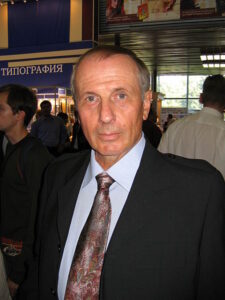
Mikhail Weller was born in Kamenets-Podolsky, Ukraine in 1948. He graduated from Leningrad University in 1972 with a degree in linguistics. He has worked as a lumberjack and hunter in the taiga, a shepherd, a teacher, and a journalist. He currently teaches modern Russian literature at the Universities of Milan, Jerusalem, and Copenhagen. His books The Adventures of Major Zvyagin (1991) and Legends of Nevsky Prospect (1993) became bestsellers. Another of Weller’s bestsellers, the scandalous The Courier from Pisa (2000), has gone through 11 reprints. His short novel The Knife of Seryozha Dovlatov caused a literary scandal.
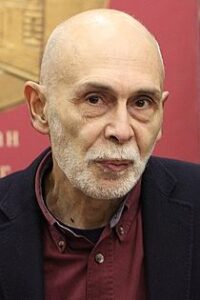
Leonid Yuzefovich was born in Moscow in 1947. He was born and raised in the Urals and graduated from Perm University. Yuzefovich has a doctorate in history (1981). Since 1975 he has been a history teacher in a Moscow school, until his retirement in 2004. Yuzefovich began writing in his youth but became widely known only after the publication of a trilogy of detective novels about the real-life 19th-century police inspector Ivan Putilin (2001). He has twice won the Big Book Award for his historical fiction: Cranes and Pygmies (Zhuravli i karliki, 2009), about the turbulent 1990s in Russia, and The Winter Road (Zimniaia doroga, 2016), about the Russian Civil War, which also won the National Bestseller Prize. Leonid Yuzefovich’s novel Филэллин (The Philhellene) won the Big Book Award, Russia’s most prestigious literary prize, in 2021.
 Oleg Zaionchkovsky was born in Samara in 1959. He comes from a well-known Russian noble family. He spent almost his entire adult life in the small town of Khotkovo near Moscow, working as an engineer at a rocket engine plant. His first two books, Sergeev and the City and Petrovich, were published in 2004. These are depictions of everyday life in an ordinary Russian town, written in a realistic style reminiscent of the Russian classics. The novel Sergeyev and the City was short-listed for the National Bestseller and Russian Booker awards. His book Happiness is Possible (2010) was also on the short list for the Russian Booker Prize and the Big Book Award. It consists of several short stories and in a beautiful, unpretentious Russian language tells of the quiet joys to be found in modern life.
Oleg Zaionchkovsky was born in Samara in 1959. He comes from a well-known Russian noble family. He spent almost his entire adult life in the small town of Khotkovo near Moscow, working as an engineer at a rocket engine plant. His first two books, Sergeev and the City and Petrovich, were published in 2004. These are depictions of everyday life in an ordinary Russian town, written in a realistic style reminiscent of the Russian classics. The novel Sergeyev and the City was short-listed for the National Bestseller and Russian Booker awards. His book Happiness is Possible (2010) was also on the short list for the Russian Booker Prize and the Big Book Award. It consists of several short stories and in a beautiful, unpretentious Russian language tells of the quiet joys to be found in modern life.
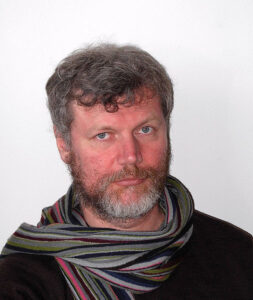 Sergey Zavyalov is a prominent representative of the St. Petersburg postmodernist poetry. He was born in 1958 in Tsarskoe Selo and graduated in Classics from Leningrad University. In 2004, he moved to Finland and to Switzerland in 2011. He is currently teaching the history of Russian poetry at the University of Zürich. Zavyalov published his first poems in the 1980s in the “samizdat,” and was a member of the art group Club-81. At the end of the 1990s, Zavyalov participated in several joint literary actions with a group of St. Petersburg poets, later to be known as postmodernists (Arkadii Dragomoshchenko, Alexander Skidan, Dmitry Golynko and others). His poetry has gradually developed from vers libre to prose poetry and from the lyrical to the epic. He has published several volumes of poetry: Melica, 2003; Orations (Rechi), 2010; Soviet Cantatas, 2015, and others. In 2015, he won the Andrei Bely Prize for Soviet Cantatas.
Sergey Zavyalov is a prominent representative of the St. Petersburg postmodernist poetry. He was born in 1958 in Tsarskoe Selo and graduated in Classics from Leningrad University. In 2004, he moved to Finland and to Switzerland in 2011. He is currently teaching the history of Russian poetry at the University of Zürich. Zavyalov published his first poems in the 1980s in the “samizdat,” and was a member of the art group Club-81. At the end of the 1990s, Zavyalov participated in several joint literary actions with a group of St. Petersburg poets, later to be known as postmodernists (Arkadii Dragomoshchenko, Alexander Skidan, Dmitry Golynko and others). His poetry has gradually developed from vers libre to prose poetry and from the lyrical to the epic. He has published several volumes of poetry: Melica, 2003; Orations (Rechi), 2010; Soviet Cantatas, 2015, and others. In 2015, he won the Andrei Bely Prize for Soviet Cantatas.
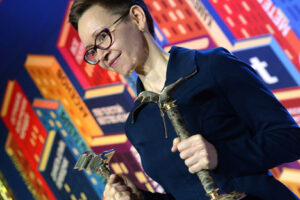
Guzel Yakhina was born in 1977 in Kazan and now lives in Moscow. She graduated from the Moscow Academy of Screenwriting. Zuleikha Opens Her Eyes is her debut novel. In 2015 it was awarded the Yasnaya Polyana Literary Prize and won the Big Book Prize. The novel tells the story of Zuleikha, a peasant woman living in a remote Tatar village in the 1930s who is sent to a Siberian labor camp. Her novel, My Children (2018), received mixed reviews but still won the popular vote for the Big Book Prize (2019). In March 2021, Yakhina’s third novel, Echelon to Samarkand (Эшелон на Самарканд), about the children of the famine-stricken Volga region in 1921, was published. In December 2022, the novel won the Reader’s Choice Award established by the Big Book Prize.
© 2015-2024 Elena Dimov / Contemporary Russian Literature / All rights reserved.
